
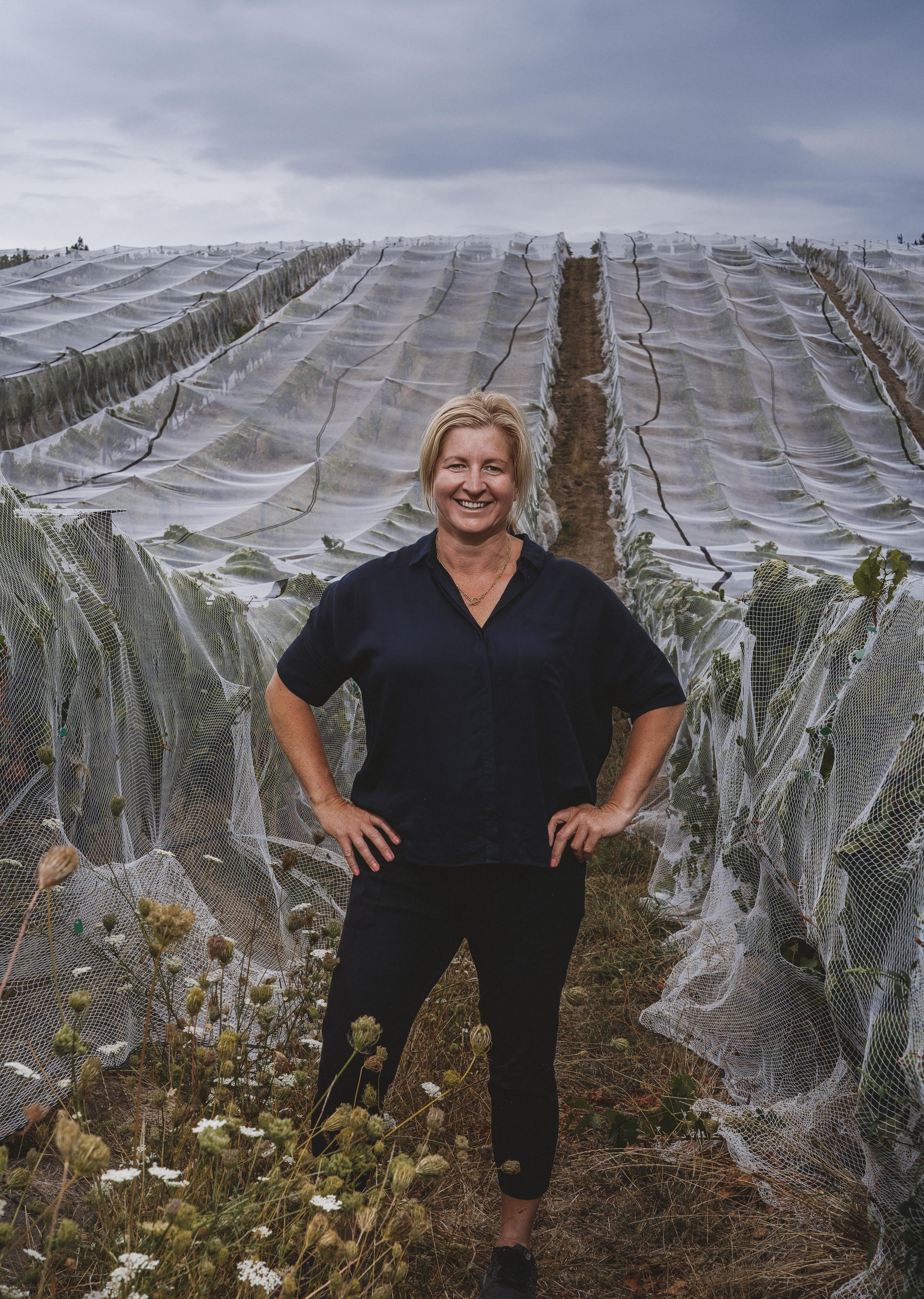
marlboroughwinenz.com LEADERSHIP INSIGHTS VILLAGE TO VILLAGE WINE FESTIVAL VINTAGE 2024 ISSUE NO. 351 / MAR 2024 THE OFFICIAL MAGAZINE OF MARLBOROUGH WINE
Photo: Jim Tannock


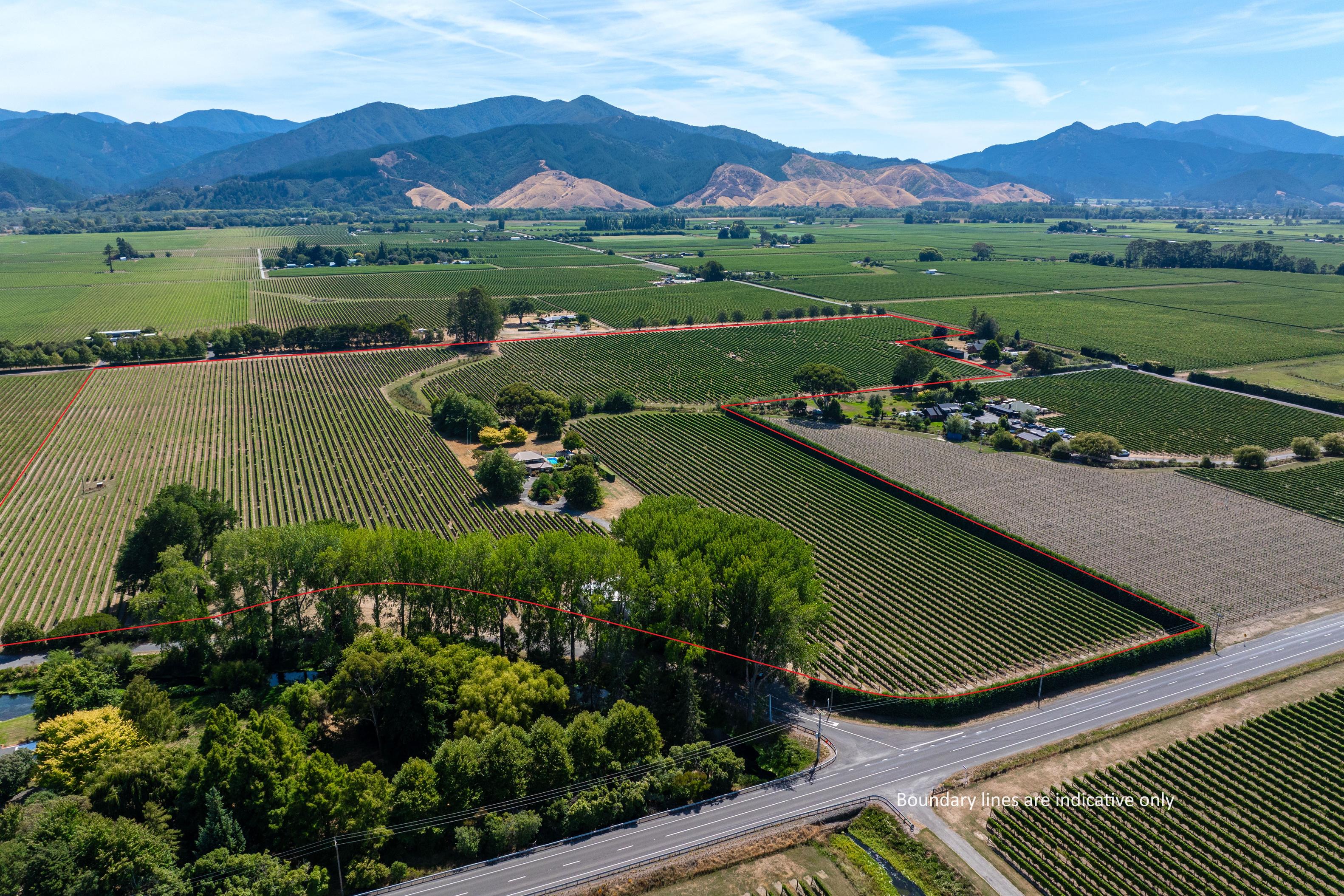


Expansive and productive land holding
Offered to the market is this impressive property situated in the tightly held Rapaura area of Marlborough. A rare opportunity to secure an expansive and highly productive land holding, comprising of 19.9 hectares complimented with an executive home. The vineyard spanning over 16.69 hectares, primarily planted in Sauvignon Blanc, provides consistent yields supported by productive and fertile soils. The architecturally designed home offers a luxurious lifestyle with enough room for the whole family with six double bedrooms and large living areas on offer. The home has been designed to maximise the Marlborough lifestyle with the perfect balance of indoor and outdoor living. The inground pool lets you indulge on a hot summers day and the private courtyard area makes outdoor dining a pleasure. Suited to a diverse range of buyers, from individuals seeking a substantial commercial vineyard with a lucrative income stream, and an impressive residence, to wine companies aiming to secure a foothold in this bountiful locale - this property offers myriad possibilities. The vineyard consistently produces highquality fruit at solid tonnages, benefitting from efficient operations thanks to its optimal vine density. Positioned at the confluence of Rapaura Road, Selmes Road, and Stump Creek Lane, the property boasts excellent accessibility from multiple entrances further enhancing long-term value. Beyond the vineyard, the meticulously maintained residence boasts captivating views of the Richmond Ranges, together with its luxury amenities, expansive landscaped grounds, a small rugby field, majestic specimen trees and a tranquil pond - the property epitomises a hidden but accessible paradise. This is an opportunity to own a lavish Marlborough lifestyle along with its promising investment qualities within Marlborough's flourishing wine industry. Contact the Mike Poff Team today to get an information pack for what this unique property has to offer.
Deadline Sale
12pm, Wed 01 May 2024
33 Seymour Street,

Mike

Charlie McLean I 027 346 1671

mike.poff@bayleys.co.nz BE MARLBOROUGH LTD, BAYLEYS, LICENESED UNDER THE REA ACT 2008
Poff I 027 665 5477
Blenheim
BE MARLBOROUGH LTD, BAYLEYS, LICENESED UNDER THE REA ACT 2008
charlie.mclean@bayleys.co.nz
bayleys.co.nz/4135818 bayleys.co.nz
Rapaura, 47 Stump Creek Road





this issue...
3 Editorial - Sophie Preece
4 Vantage Point - Lucy MacLean
Photo
22 Generation Y-ineThomas Jordaan
24 Biosecurity WatchSophie Badland
26 Industry News
28 Wine Happenings
Cover: Tinder dry conditions have winegrowers using every drop of water with care, says Dog Point Vineyards' Anna Dunne in the lead up to harvest. Photo Jim Tannock. Go to page 12
4 Leaderful Region
In this month’s Vantage Point, Lucy MacLean talks of growing good leaderships, by capitalising on the opportunities “and bright spots” that already exist in Marlborough.
14 Village to Village Cloudy Bay Vineyards is working with Marlborough’s Village to Village charitable trust to offer interest-free loans to seasonal workers wanting to develop an agriculture-based business in their home country.
16 Leading Wellness
The passion driving Marlborough’s wine industry is part of its superpower, but can result in unsustainable commitment to the coalface. As the second Wine Industry Wellness Week approaches, the industry looks at ways of balancing productivity and wellbeing to ensure longterm success.
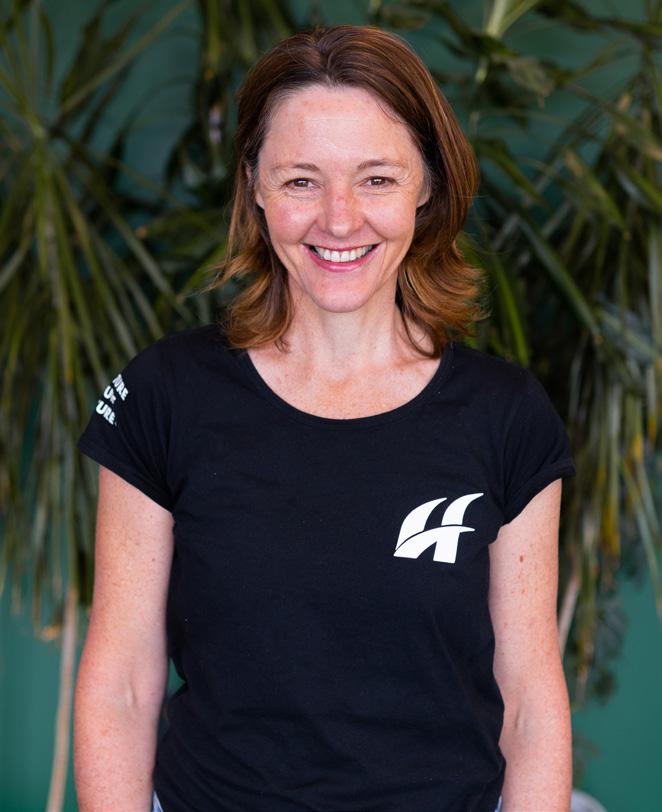


Winepress Mar 2024 / 1 4 22 16
REGULARS FEATURES
10
Page - Marlborough Wine & Food Festival
10
Photo Richard Briggs
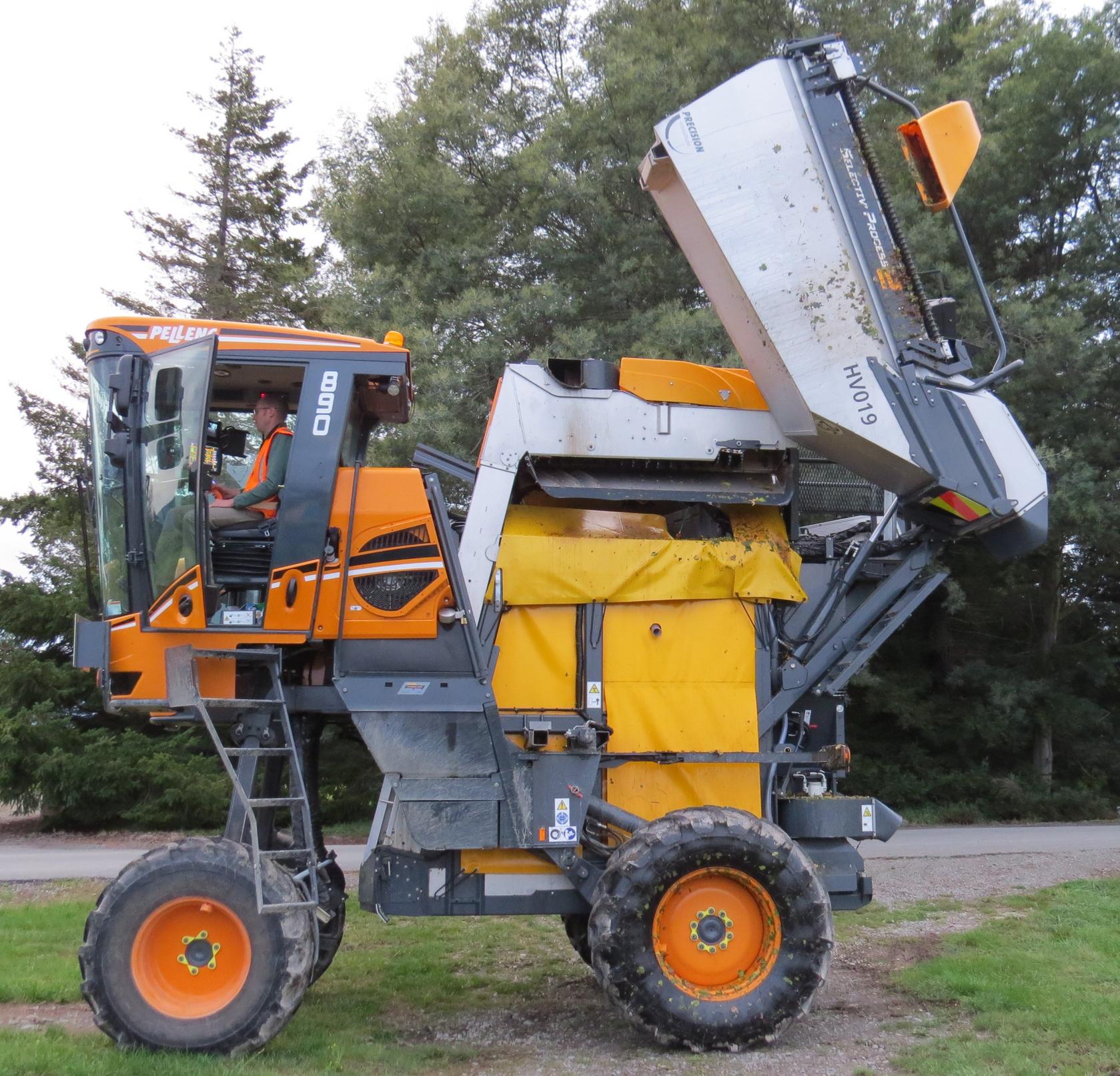
SAFETY AROUND LIVE OVERHEAD LINES
Working on a vineyard can put you in all kinds of situationsbut close to electrical equipment and overhead conductors should never be one of them
Prior to vintage 2018 Marlborough Lines (MLL) undertook a safety campaign to ensure that wine companies, harvest contractors, growers and vineyard owners were aware of the legal requirements for working around live overhead electric lines
Since then there has been a great response from a wide variety of wine industry participants, and incidents involving mobile plant and overhead lines have thankfully been few in number over that period
As the network owner, MLL is very mindful of the need to keep "safe working distances" fresh in everybody's minds. While the focus since 2018 has been on the higher risk period over vintage, the requirement extends throughout the year where other vineyard operations are undertaken in the vicinity of overhead lines
Based on the great response and increased awareness MLL intends to continue with a focus on education, and to encourage a risk-based approach with respect to the operation of mobile plant as a normal part of your hazard assessment for all of your operations

THE REQUIREMENTS
When mobile plant will be operating (tipping, raising or lowering) 4 metres or less from overhead lines, under section 5.2.1 of NZECP 34 you must apply to MLL for written consent (Close Approach Authority) that allows the mobile plant to operate at a reduced distance.
In other circumstances, when mobile plant is not operating within 4 metres of a live overhead power line, you should identify the risks and apply appropriate controls to prevent harm and/or damage occurring.
What you need to know - tips to stay safe
Vineyards often have overhead power lines near or running through them, so there is significant risk - to you or your equipment - of accidentally touching the lines. You don't even need to touch the line to be in dangerelectricity can jump through the air to you and your equipment.
Every line must be treated as live. Always.
Don't locate dump/load sites under or near overhead power lines.
When moving tall machinery, choose the route where power lines are high enough for adequate clearance. Always have any mobile plant device capable of being raised or lowered, in the lowered position prior to moving under lines.
Ensure operators are competent in the operation of their machines, thoroughly briefed and understand the dangers of working near overhead power lines.
Ensure a competent safety observer is able to maintain effective communication with the operator and alert them to any perceived hazard.
Before you harvest, prune, load or move equipment, look up and familiarise yourself with the location of any overhead power lines.
Locate a warning notice as near as practicable to the operator/driver's position stating "WARNING KEEP CLEAR OF POWER LINES". These stickers are available from MLL.
If you believe you may require a Close Approach Authority, need warning stickers, or have any questions, please phone Marlborough Lines on 03 577 7007 or email info@mll.co.nz to discuss.
We are happy to provide advice to help ensure everyone remains safe and well when working near overhead lines.
V I N E Y A R D S A F E T Y M A R L B O R O U G H L I N E S
us
Obeying the rules can help ensure all workers' safety Contact
Get to know NZECP 34 It could save your life
General Manager: Marcus Pickens
03 577 9299 or 021 831 820 marcus@winemarlborough.nz
Editor:
Sophie Preece 027 308 4455 sophie@sophiepreece.co.nz
Marketing and Communications: Sarah Linklater 021 704 733 sarah@winemarlborough.nz
Events Manager: Loren Coffey loren@winemarlborough.nz
Advocacy Manager: Nicci Armour advocacy@winemarlborough.nz
Advertising:
Joanna May advertising@winemarlborough.nz
Grape Grower Directors: Andrew Nation nationa@gmail.com
Bryn Cotching breezemere@hotmail.com
Michiel Eradus michiel@eraduswines.co.nz
Nigel Sowman nigel@dogpoint.co.nz
Tracy Johnston tracy@dayvinleigh.co.nz
Wine Company Directors: Beth Forrest beth@forrest.co.nz
Damien Yvon damien@closhenri.com
Drew Ellis drew@mggcoop.co.nz
James Macdonald james@hunters.co.nz
Jamie Marfell Jamie.Marfell@pernod-ricard.com
Designed by:
Blenheim Print Ltd 03 578 1322
Disclaimer: The views and articles that are expressed and appear in Winepress are entirely those of contributors and in no way reflect the policy of the Marlborough Winegrowers. Any advice given, implied or suggested should be considered on its merits, and no responsibility can be taken for problems arising from the use of such information.
This document is printed on an environmentally responsible paper, produced using elemental chlorine free (EFC), third party pulp from responsible sources, manufactured under the strict ISO 14001 Environmental Management System and is 100% Recyclable.
From the Editor

THE GRAPE harvest is a timely reminder that winegrowing is primary production, subject to the vagaries of nature and the volatilities of markets. Last year was the threat of cyclones and rain-induced disease, while buyers clamoured for Marlborough Sauvignon Blanc. This year it’s light crops — thanks to inflorescence, frosts and flowering — and tinder dry vineyards, in which every drop of irrigation matters – for those lucky enough to still have some.
In a glass-half-full-world the light crop might provide a ‘reset’ for markets that found their shelves crowded in the wake of just-in-case Covid shopping, and have slowed up in ordering wine. One grower I spoke to noted that news of Marlborough’s light vintage is already setting order books aflutter abroad, as people consider the ramifications of a potential Sauvignon shortfall.
But while viticulturists, vineyard managers and winemakers walk the rows, assiduously assessing vine health, grape quality, weather reports and picking dates – essentially farmers checking their land and crops – this is also a time of year that showcases why our crop is unlike any other. In February we had Brookby Beats on a beautiful hillside vineyard with five boutique producers pouring wines in the valley that grew them, surrounded by a sold-out crowd of mostly-locals delighted by the wine, food and music. The next day was the Marlborough Wine & Food Festival, where thousands of attendees, many of them visitors to Marlborough and devoted to the region’s wine offerings, sampled myriad wines, tasted delicious dishes, learned from experts and danced to an array of feted musicians. Two weeks after the festival, a fleet of yachts set off through the sounds, carrying the region’s wines to Resolution Bay in the WineWorks Marlborough Wine Race. For a small provincial town fuelled by grape growing, these are world-class events made possible by a single product.
The start of vintage 2024 is also a reminder that the teams in the vineyard and winery get one chance a year to get everything right, adding to the pressure wrapped around harvest. The second Marlborough Wine Industry Wellness Week will roll out in the wake of the onslaught, but the team behind it is already sharing tips for keeping heads above water in the busy weeks ahead. For some companies that will mean six day weeks with measured hours at the coalface, while for others vintage remains a time to dig in, investing all the hours it takes to get the job done, with a good rest at the end. All the best for Vintage 2024!
M A R L B O R O U G H L I N E S Winepress Mar 2024 / 3
SOPHIE PREECE
Vantage Point
Marlborough’s Wine Industry Strategic Workforce Planning Steering Group was founded in 2022 to grow understanding of the region’s current and future workforce skills requirements. Leadership is a natural part of that planning, says steering group member and Hortus general manager of people, culture, and communication, LUCY MACLEAN.
THE WINE Industry Strategic Workforce Planning Steering Group wants to understand the current and future workforce, and the skills required for the future. We’re primarily focused on an analysis of the skills needed across the workforce, based on the national wine industry skills survey and skills clustering initiated last year. Data collection and skills mapping have been completed and the final report and outputs are due to be completed soon. But we are also curious about wellbeing, resilience, and leadership, which are all integral to our future workforce.
Late last year a leadership working group was formed to explore the idea of building a region of great leadership, rather than just at an individual or organisational level. This vision of building capability and leadership at a regional level is supported by the Economic Development team at Marlborough District Council, through its Innovate Marlborough strategy, as well as Wine Marlborough, Marlborough Chamber of Commerce, Business Trust Marlborough, and the Collaboration, Innovation & Transformation (CIT – formerly Smart + Connected) Labour and Skills group.
“People want to experience, contribute to, and shape a different type of leadership in our region.”
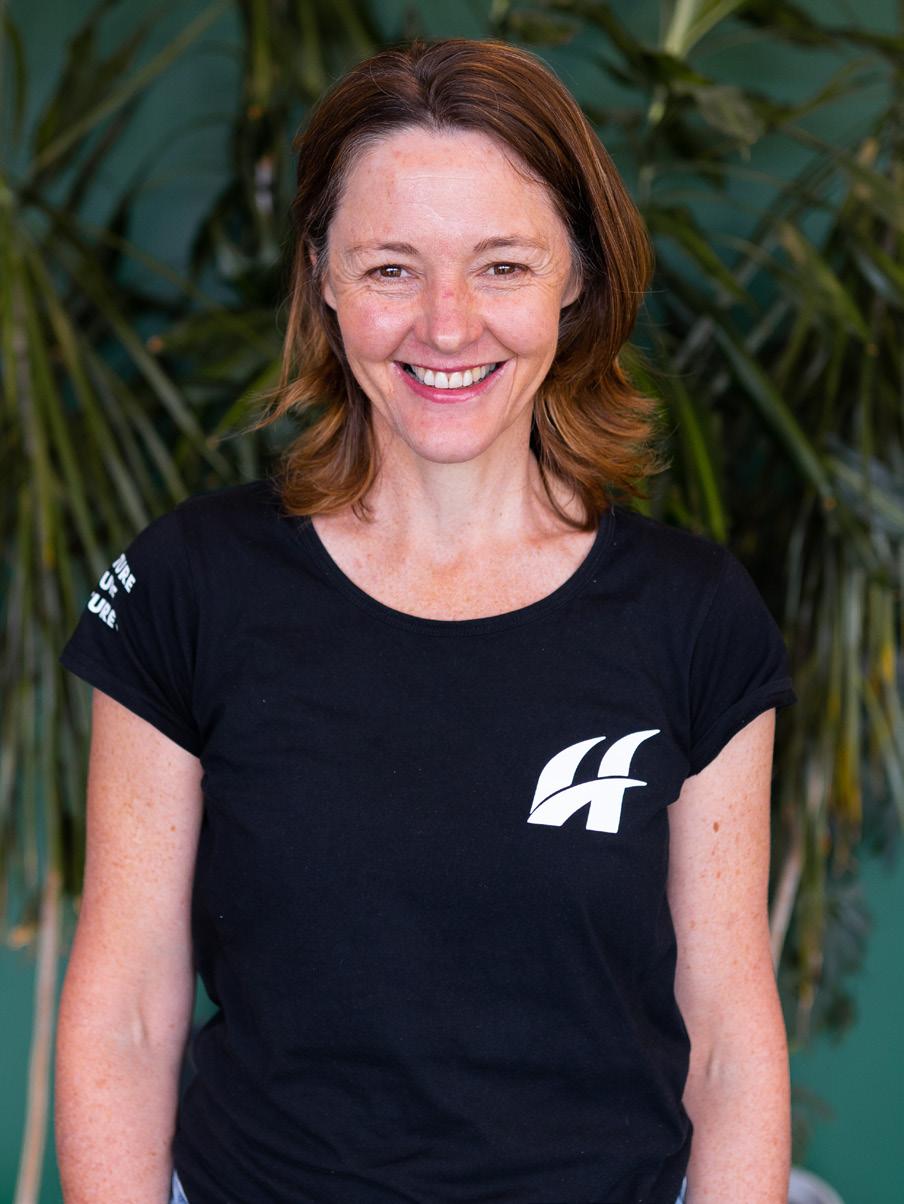
Lucy MacLean
potential to be realised and they wanted to be part of that conversation.
Meanwhile, leaders from outside the wine sector spoke to a desire for our region to be more socially and environmentally aware and connected; to be bold and gutsy in our leadership. There was a desire to not just fill our own cup as leaders, but to fill the collective jug. People were inspired to be on a leadership journey that is about helping others, ecocentric, and playing the long game. To build a leaderful region. What is coming out of the conversations we are having, is that people want to experience, contribute to and shape a different type of leadership in our region.
Late last year we worked with leadership expert Digby Scott to get the perspective of more than 30 people on developing leadership across the region, and the conversations were incredibly inspiring. People within the wine sector spoke about their passion for great winemaking and the legacy of the past 50 years. They saw an opportunity to be very deliberate and intentional about designing the legacy for the next 50 years, including the creation of an environment where the next generation can thrive and be successful. There was a strong collective spirit for the Marlborough wine region to be a place where we are overwhelmed with great people across a wide range of roles. They want Marlborough to be seen as an attractive place to live and work for everyone. There was a common mindset and desire to actively shape a long-term future. People within our industry had a real sense that there’s so much
In analysing the discussions, Digby found a desire for a region where younger people can see and feel the opportunity and pathways to create a vibrant future for their career and life, making this a “destination of choice”. He also found people looking for greater connectedness across industries and sectors, building a stronger social fabric and collective spirit. People talked of the need to capitalise on the opportunities and bright spots that already exist here, and the wish for a leaderful region, where the culture is one that reflects a ‘growth mindset’ – ever-envisioning, everexperimenting, ever-learning, ever-evolving.
When we asked Digby how we go about creating a ‘leaderful’ region, he used the petri dish as a metaphor: Everyone in Marlborough is part of the ‘petri dish’ and ultimately, we want everyone to contribute to the success of the region. To begin with, we need to find and invest in ‘activators’ across a diverse set of sectors and industries who can accelerate positive change by coming together as a group of leaders and learners. These people are likely to have a stake in the future of the region, be ‘ecocentric’, not
4 / Winepress Mar 2024 EDUCATE
‘egocentric’, with a ‘host’ not ‘hero’ mindset. Their intent is to create the conditions to grow other leaders around them. The activators are intentional connectors: their attention is on developing networks of relationships to lead together, not in siloes and patches. And they want to grow their ability to lead.
There is an appetite to talk about leadership and what that specifically means for our region. Evidence of this is the Grow, Perform Sustain workshop delivered by Nick Petrie in November, attended by more than 100 people. We then had 30 people prioritise two hours of their time right before Christmas to have a conversation about leadership. The leadership working group is keen to keep the momentum going and will continue to work alongside Wine Marlborough and the Economic Development team, along with Nick and Digby, to make things happen.
Take the lead
When Marlborough winegrower Ben McLauchlan received a Nuffield Scholarship in 2020, he focussed on a ‘Mindset of Change’. In the first of our series on leadership, the Marlborough Grape Growers Cooperative chair looks at what mindset means to leadership.
What does leadership mean to you?
For me leadership is about actions and mindset. It is about empowerment, about setting people up for success, so everyone in a team is pulling in the same direction to achieve the same goal. It is important to understand that no one person has all the answers; that the whole is always going to be greater than the individual. Great leadership is treating people as an asset and not as an input. It is about creating an environment that people can be the best they can be. A place where everyone is valued and no one is too important to sweep the floor. That everyone has something to offer and can hold the answers to the most difficult problem
What’s required?
Great leadership is required to be able to help solve our sticky problems. We are faced with a continually changing world. Our consumers are focused on health and wellbeing, and a sustainable future where products are produced in harmony with nature. The fundamentals of great leadership have not changed over the years. It is all about people and how we can work together and harness the value of everyone. However, who and what we have to consider has changed – with the advent of the extremely quick transfer of information via social media, we are in a time when the consumer has to be considered in all that we do. We need great leadership to be able to navigate the fast-changing world we live in. To enable us to grow and adapt to our consumers needs and wants.
What are key leadership challenges?
For me the key challenge is how we harness the value of our key assets in our industry – people. How do we engage them? How do we free them to have a growth mindset? This is a mindset where they want to be challenged; understand that when they fail, they learn; how their effort and attitude determine everything. One of my favourite quotes sums up the challenges that we have faced and will into the future: “The only constant in life is change” (Heraclitus). How we embrace and accept change is the key challenge facing us all. As James Parsons (Nuffield Scholar 2008) said: “Great management is optimising the model – great leadership is creating a new model.”

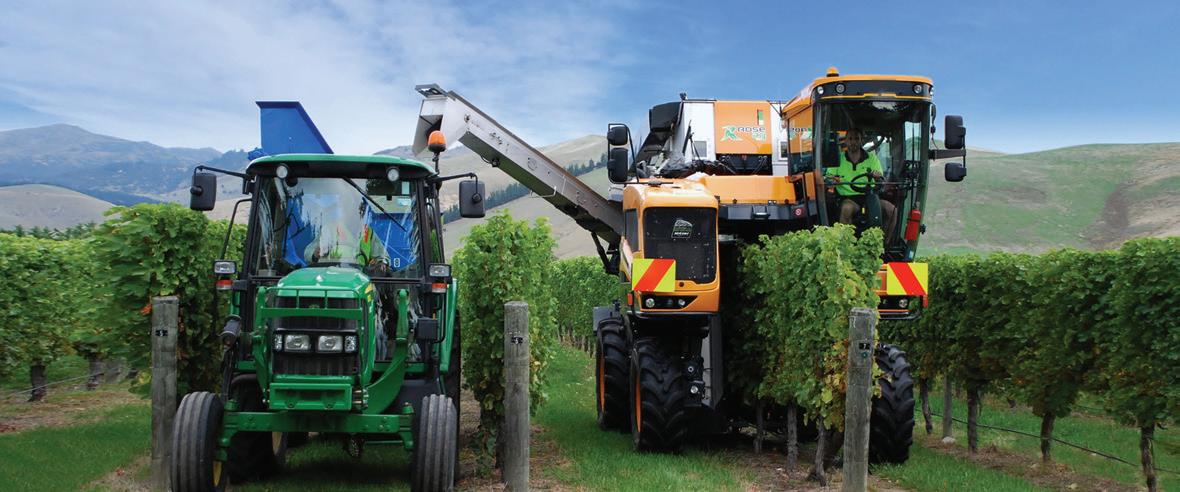
Winepress Mar 2024 / 5 GROW


greater than the LTA of 10.7°C. i.e. warm days and cool nights in February 2024. It is generally the daytime temperatures that we remember, rather than the nighttime temperatures. The warm days, cool nights and dry weather were ideal weather conditions for ripening Marlborough’s grapes.
The hottest maximum temperature recorded in Blenheim was 32.3°C on 6 February 2024. This was the only day during the month to surpass 30.0°C. However, there were 15 days during February when the maximum temperature exceeded 25.0°C. The coolest minimum temperature recorded in Blenheim was 6.1°C on 4 February 2024.
Summer temperatures
At the beginning of December 2023
1GDD’s Max/Min are calculated from absolute daily maximum and minimum temperatures
2GDD’s Mean are calculated from average hourly temperatures
Temperature
February 2024 mean temperature of 18.0°C was 0.1°C above the long-term average (LTA) temperature for February (1986-2023). Most people would probably think that the mean temperature would have been further above the LTA. The average daily maximum temperature was 1.1°C above the LTA. However, the average daily minimum was 0.9°C below the LTA and this dragged the mean temperature down. The daily range in temperature was 12.7°C, which was 2.0°C
NIWA predicted for Marlborough that there was a 45% chance of above average temperature, 45% chance of average temperature and only a 10% chance of below average temperature over the full 3-month period from December 2023 to February 2024; i.e. they were fairly sure that Marlborough would experience a warmer than average summer. The average temperature for the three summer months of 18.4°C was 0.7°C above the LTA. This was Blenheim’s 9th warmest summer on record over the 92 years from 1932-33 to 2023-24; NIWA’s prediction was correct. All 3-months of summer 2023-24 recorded above average mean temperatures (Table 3).
6 / Winepress Mar 2024
Feb Feb 2024 Feb Period Feb 2024 compared to LTA of LTA 2023 LTA GDD’s for: Month - Max/Min1 230.9 102% 227.0 (1996-2023) 245.7 Month – Mean2 225.3 103% 219.5 (1996-2023) 241.0 Growing Degree Days Total Jul 23–Feb 24 – Max/Min1 1098.5 95% 1044.4 (1996-2023) 1124.4 Jul 23–Feb 24 – Mean2 1137.3 95% 1075.7 (1996-2023) 1144.7 Mean Maximum (°C) 24.3 +1.1°C 23.2 (1986-2023) 23.4 Mean Minimum (°C) 11.6 -0.9°C 12.5 (1986-2023) 14.1 Mean Temp (°C) 18.0 +0.1°C 17.9 (1986-2023) 18.8 Grass Frosts (<= -1.0°C) 0 Equal 0.03 (1986-2023) Air Frosts (0.0°C) 0 Equal 0.00 (1986-2023) Sunshine hours 287.4 126% 228.5 (1986-2023) 193.9 Sunshine hours – lowest 133.6 2012 Sunshine hours – highest 298 1968 Sunshine hours total – 2024 604.1 123% 492.7 (1986-2023) 405.6 Rainfall (mm) 12.6 25% 48.6 (1986-2023) 40.2 Rainfall (mm) – lowest 1 1973 & 1983 Rainfall (mm) – highest 181.4 2018 Rainfall total (mm) – 2024 19.2 21% 90.5 (1986-2023) 100.6 Evapotranspiration – mm 140.0 122% 114.3 (1996-2023) 111.0 Avg. Daily Windrun (km) 234.6 96% 245.4 (1996-2023) 212.6 Mean soil temp – 10cm 19.7 +1.4°C 18.3 (1986-2023) 18.7 Mean soil temp – 30cm 21.8 +1.2°C 20.6 (1986-2023) 20.5
Table 1: Blenheim Weather Data – February 2024
Mean Mean Max Mean Min Rainfall Sunshine Wind-run (°C) (°C) (°C) (mm) (hours) (km) 1st - 7th 18.4 (+0.5) 25.4 (+2.2) 11.3 (-1.2) 10.6 72.9 235.7 8th - 14th 17.6 (-0.3) 24.3 (+1.1) 10.9 (-1.6) 0 74.7 221.9 15th - 21st 18.4 (+0.5) 23.8 (+0.6) 12.9 (+0.4) 0 69.9 271.0 22nd - 29th 17.6 (-0.3) 23.7 (+0.5) 11.4 (-1.1) 2.0 69.9 213.0 1st – 29th February 18.0 (+0.1°C) 24.3 (+1.1 ) 11.6 (-0.9°C) 12.6 26% 287.4 126% 234.6 96% LTA 1986-2023 17.9 23.2 12.5 48.6 228.5 245.4
Table 2: Weekly temperatures, rainfall, sunshine and wind-run during February 2024
Sunshine
Blenheim recorded 287.4 hours sunshine in February, 126% of the LTA. This is now the seventh sunniest February on record for Blenheim over the 95 years 1930 to 2024.
December 2023 sunshine hours were only slightly below average. January and February 2024 recorded well above average sunshine hours. The summer sunshine total of 848.7 hours, for 2023-24 is the second highest total for the 94 years on record, from 1930-31 to 2023-24. 1972-73 is the sunniest summer on record with 857.6 hours.
Rainfall
February rainfall total of 12.6 mm was 26% of the LTA (1986-2023). Of interest is the fact that in 20 previous years between 1930 and 2023, February has recorded a lower rainfall total. The lowest February total on record of 1.0 mm was recorded in both 1973 and 1983.
Over the most recent 20 years from 2005 to 2024, February has recorded lower than average rainfall in 16 of those years. Only 4 of the 20 years have recorded above average rainfall. However, February 2018 with 181.8 mm and February 2022 with 153.4 mm are the highest and second highest February totals on record. This demonstrates what climate scientists have suggested may occur in Marlborough (and the east cost of New Zealand), in that the lows may become lower and the highs higher.
All 9-months from June 2023 to February 2024 recorded below average rainfall. Total rainfall for the 9-months was 206.8 mm, only 42% of the LTA of 495.6 mm. This is the lowest rainfall total for this 9-month period on record for the 94 years 1930-31 to 2023-24.
Total summer rainfall in 2023-24 of 32.8 mm was 24% of the LTA total. This is the second lowest summer rainfall on record for Blenheim over the 94 years 1930-31 to 2023-24. The lowest total of 27.2 mm was recorded in the summer of 2000-01.
Wind Run
Average daily wind run for February 2024 was 234.6 km, 96% of the LTA (1996-2023) of 245.4 km. There were 9-days in February with above average wind-run and 20 days with below average wind-run.
Winepress Mar 2024 / 7
Long-term 2017-18 2018-19 2019-20 2020-21 2021-22 2022-23 2023-24 Average Mean Mean Mean Mean Mean Mean Mean °C °C °C °C °C °C °C °C December 16.9 18.7 17.4 16.7 16.7 18.6 16.8 18.1 January 18.2 20.7 20.7 17.5 18.4 18.3 18.0 19.2 February 17.9 18.8 18.9 19.2 17.5 17.3 18.8 18.0 Mean 17.7 19.4 19.0 17.8 17.5 18.1 17.9 18.4 +/-LTA +1.7 +1.3 +0.1 -0.2 +0.4 +0.2 +0.7
Table 3: Monthly mean temperatures over the 7 summers from 2017-18 to 2023-24
Long-term 2017-18 2018-19 2019-20 2020-21 2021-22 2022-23 2023-24 Average hours hours hours hours hours hours hours December 248.8 319.1 213.2 272.6 255.4 201.5 234.2 244.6 January 264.2 243.6 317.9 245.0 309.0 313.8 211.7 316.7 February 228.5 226.4 289.4 270.9 263.9 156.4 193.9 287.4 Total 741.5 789.1 820.5 788.5 828.3 671.7 639.8 848.7 106% 111% 106% 112% 91% 86% 114
Table 4: Sunshine hours over the 7 summers from 2017-18 to 2023-24
Long-term 2017-18 2018-19 2019-20 2020-21 2021-22 2022-23 2023-24 Average mm mm mm mm mm mm mm December 47.5 21.6 53.6 91.2 22.8 85.8 48.8 14.2 January 41.9 80.4 3.8 0.2 7.8 12.6 60.4 6.6 February 48.6 181.4 8.0 8.6 22.8 153.4 40.2 12.6 Total 138.0 mm 283.4 mm 65.4mm 100.0mm 53.4mm 251.8mm 149.4mm 33.4mm 204% 47% 72% 38% 181% 108% 24%
Table 5: Rainfall over the 7 summers from 2017-18 to 2023-24
Shallow Soil Moisture
Average shallow soil moisture (5–35 cm depth) at the Grovetown Park weather station for February was 15.1%. This is well below the LTA of 18.9%. The minimum moisture value that the topsoil goes down to is about 14%, i.e. the topsoil was close to as dry as it could be throughout February. Even the 10.2 mm rain recorded on 2 February only raised the topsoil moisture from 14.6% to 15.7%.
Potential Evapotranspiration
Potential evapotranspiration for February 2024 was 140.0 mm, 122% of February’s LTA of 114.3 mm.
Potential Water Deficit
Potential water deficit (Table 7) is the difference between monthly rainfall received (Table 5) and potential monthly evapotranspiration lost (Table 6). Potential water deficit for February 2024 was -127.4 mm, 175% of the LTA water deficit for February of -72.9 mm.
Plant & Food Research – Marlborough Research Centre


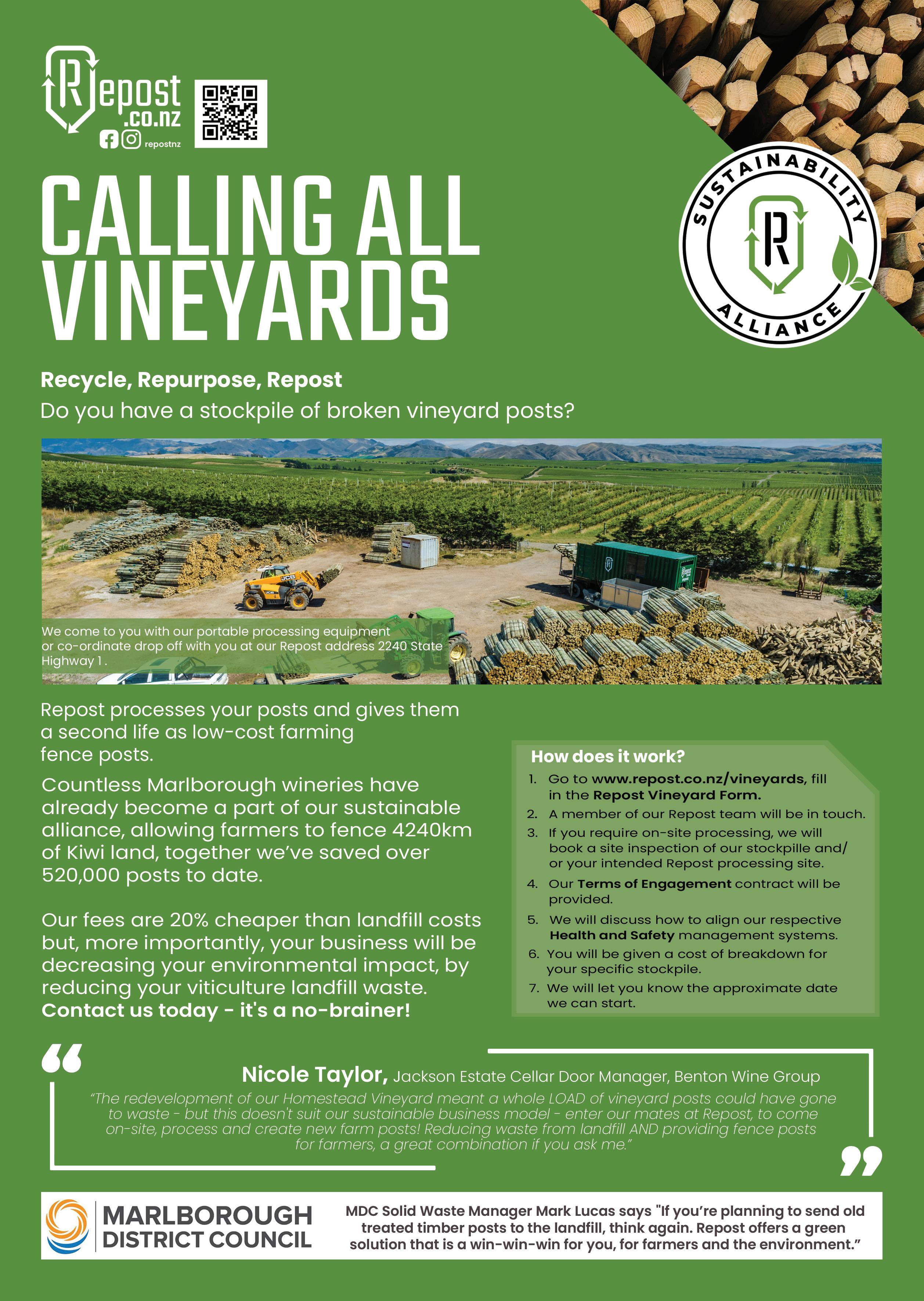
8 / Winepress Mar 2024
Rob Agnew
Long-term 2017-18 2018-19 2019-20 2020-21 2021-22 2022-23 2023-24 Average mm mm mm mm mm mm mm December 139.8 177.8 114.9 140.1 143.2 135.1 118.2 150.4 January 144.0 135.6 186.9 133.9 172.3 152.5 121.3 165.9 February 114.3 122.4 151.0 140.3 123.3 86.6 111.0 140.0 Total 398.1 mm 435.8 mm 452.8 mm 414.3 mm 438.8mm 374.2mm 350.5mm 456.3mm 109% 114% 104% 110% 94% 88% 115%
Table 6: Potential evapotranspiration over the 7 summers from
2017-18 to 2023-24
Long-term 2017-18 2018-19 2019-20 2020-21 2021-22 2022-23 2023-24 Average mm mm mm mm mm mm mm December -92.6 -156.2 -61.3 -48.9 -120.4 -49.3 -69.4 -136.2 January -104.9 -55.2 -183.1 -133.7 -164.5 -139.9 -60.9 -159.3 February -72.9 +59.0 -143.0 -131.7 -100.5 +66.8 -70.8 -127.4 Total -270.4 mm -152.4 mm -387.4mm -314.3mm -385.4mm -122.4mm -201.1mm 422.9mm 56% 143% 116% 142% 45% 74% 156%
Table 7: Potential Water Deficit over the 7 summers from 2017-18 to 2023-24

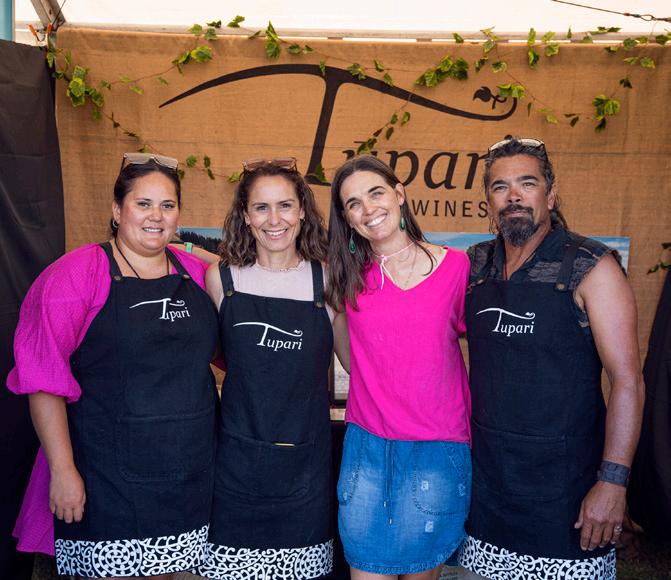


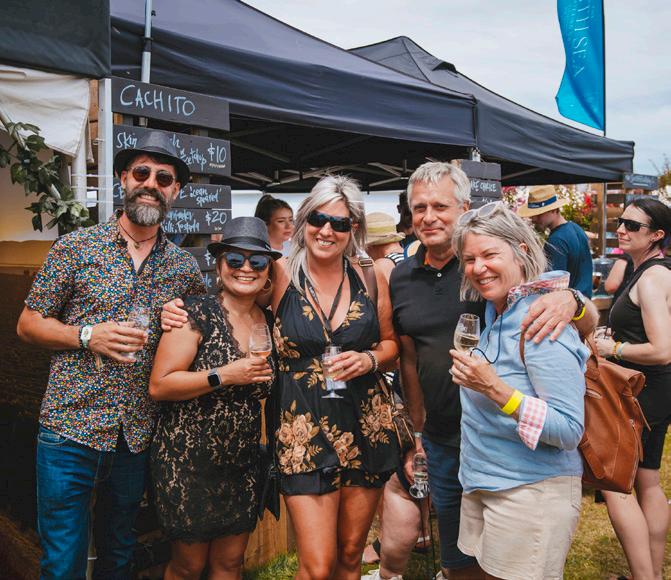
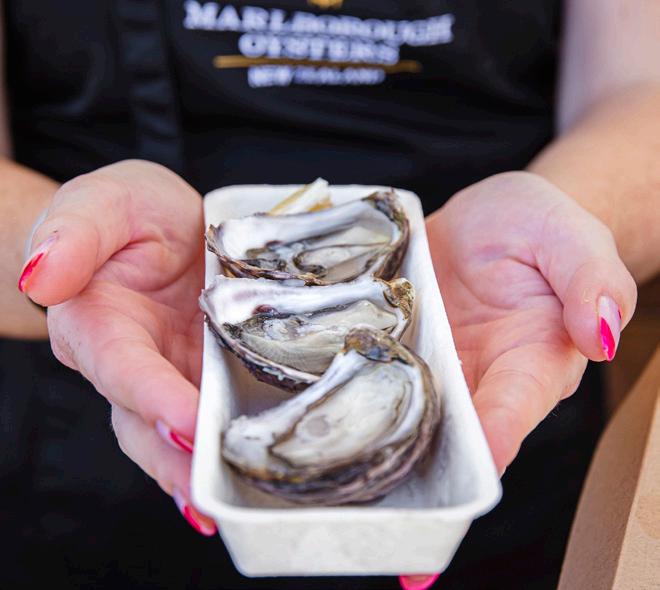




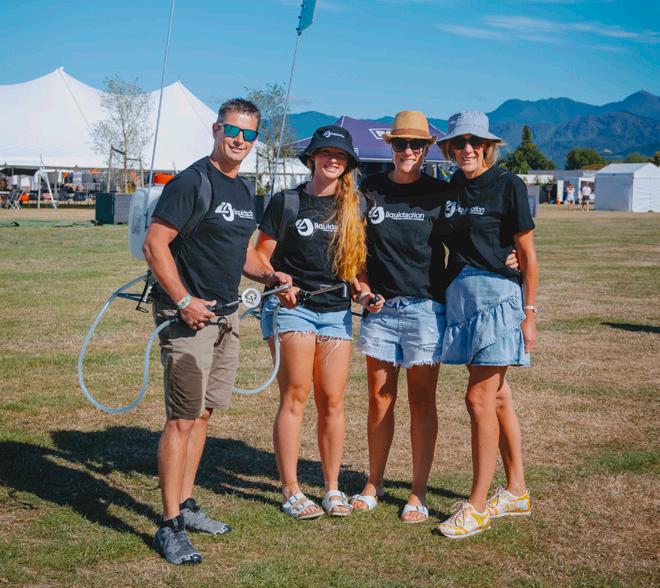

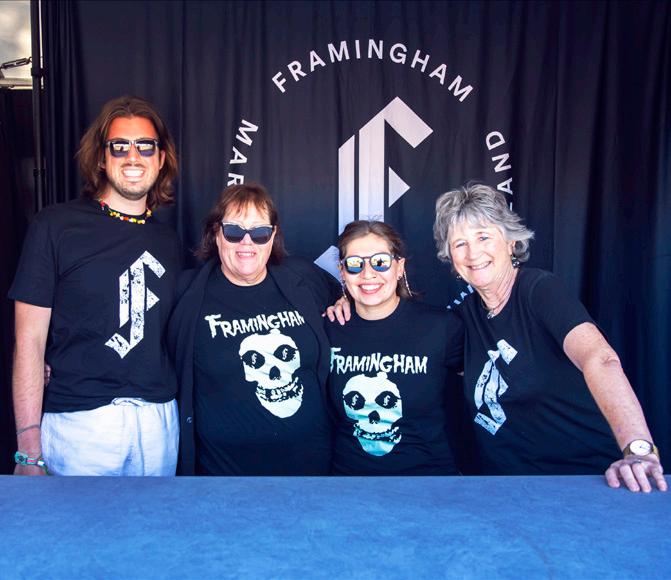


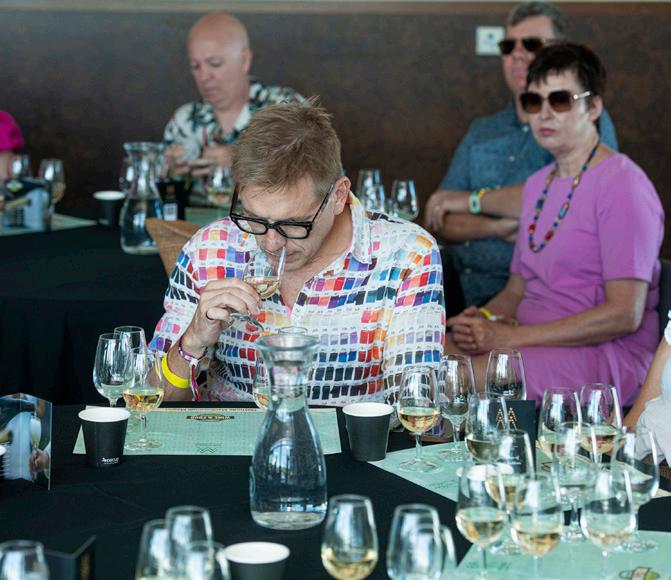

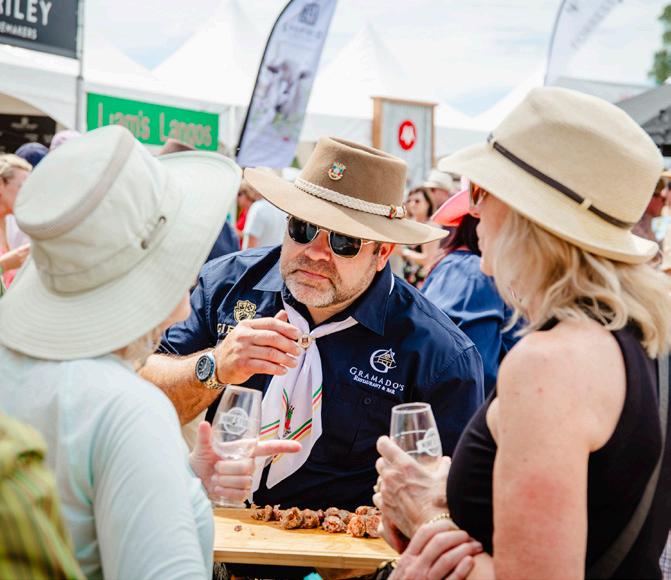

10 / Winepress Mar 2024 CELEBRATE
Andy Hearnden entertains in the Culinary Pavilion. Photos here and facing page by Richard Briggs 2024
A warm welcome from Tūpari
The Méthode Marlborough Masterclass
Two local food heroes, Emma and Saulo Camillo Nunes
Liquid Action's water angels kept everyone hyrdrated
All four masterclasses were sold out
An iconic festival for nearly 40 years
The Framingham team in form
Plenty to learn in the Culinary Pavilion
Shucking awesome Tohu's Team
Attendees were keen to learn more about the wines
Gramados and Frank's Oyster Bar had pop up restaurants
Chef Sam Webb in the Culinary Pavilion
Chef Sam Webb in the Culinary Pavilion



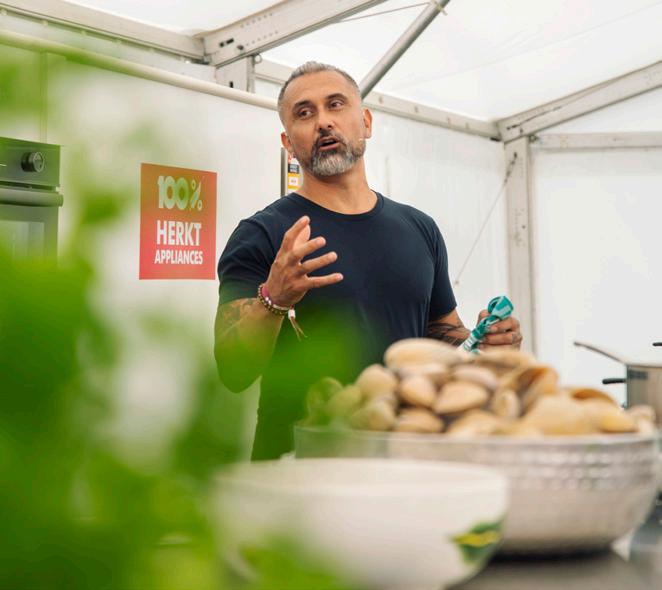


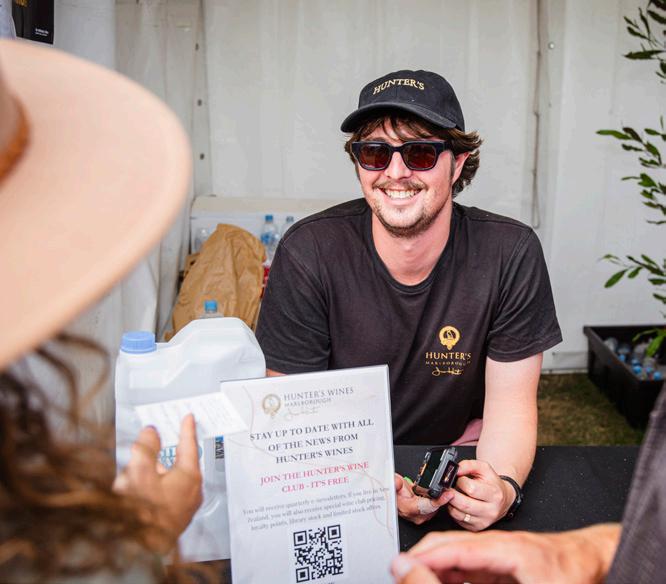
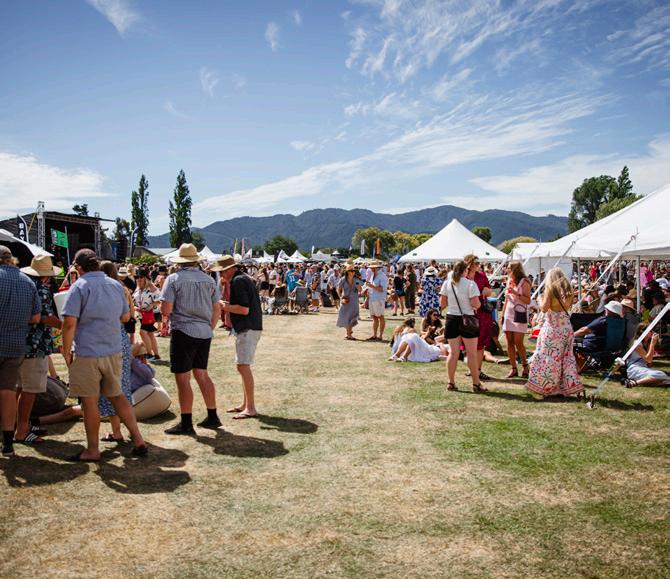





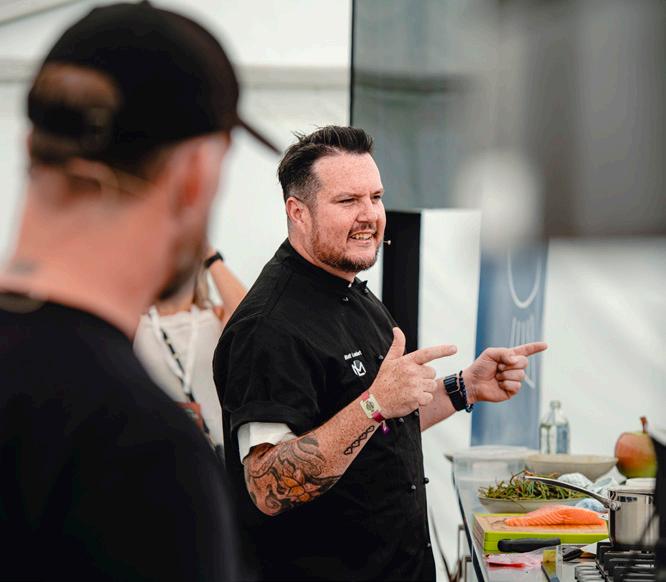

Winepress Mar 2024 / 11 CELEBRATE
Rimapere won the best site award
Local musician Chloe Vitale opens the Festival
Dishing up the goods
Loving life in The Lounge
Hunter's has been there from the festival's earliest days
Hunter's has been there from the festival's earliest days Drax Project
The event's second year at Renwick Domain
The team at Nautilus
Everything is looking Rosé
Photos by Richard Briggs
Great weather, great people, great wine, great food
More than 6,100 attendees at this year's festival
Michael Meredith with Cloudy Bay clams
The dance floor got plenty of use
Matt Lambert working with Ōra King Salmon
Vintage 2024
Drought conditions as harvest begins
SOPHIE PREECE
A HOT, dry and windy summer has delivered tinder dry conditions for vintage 2024, with grape growers making the most of remaining water allocations as harvest gets underway. “It’s becoming one of the very driest years since I have been involved in this business,” says Fruition Horticulture consultant Jim Mercer in late February, as picking for sparkling and lighter alcohol wines gathers speed. “There are a lot of vineyards where they are on top of it and visual stress symptoms are not that bad or not at all,” he says. “But there are definitely blocks as you drive around that are seriously water stressed.”
“All the goodness is going into the fruit that is there; the crops are light but the quality should be amazing.”

Anna Dunne
Dry Marlborough summers are typically mitigated by rain in December, or a decent rain event in January or February, “but we have had none of those”, Jim says, awaiting official confirmation of what he already deems drought status. The wind and heat in January and the first weeks of February led to extraordinary rates of evapotranspiration, and the occasional light rainfall served only to “dampen the dust”. Despite the lack of rain on the plains, rainfall in the wider catchment has refreshed the Wairau River, allowing growers with relevant water rights to continue irrigation, “but we are running a fine line in terms of the Southern Valleys Irrigation Scheme (SVIS)”, Jim says. Meanwhile, Awatere River Class B rights were shut down in early February, with Class A being rationed at times.
Dog Point Vineyards taps into the SVIS, and is working
hard to ensure every drop available goes to the vines, says Anna Dunne, general manager of viticulture and operations. “We have no moisture in the soil. Whatever we are putting on is what the vines are getting.” That means scheduling evening irrigation for wind-battered hill sites whenever possible, prioritising soil types that require more water, and fixing leaks the moment they’re spotted. Constant WhatsApp communication between teams has been invaluable for effective water use and vine care, Anna says. Speaking on February 26, the team was preparing for a SVIS shutdown, at which point Dog Point will revert to its wells and dams, she says, grateful for the foresight of her parents and vineyard founders Ivan and Margaret Sutherland, in ensuring there are secondary water sources for drought years.
If the dry is one defining feature of the 2024 vintage,

12 / Winepress Mar 2024 GROW
Photo by Jim Tannock
a modest crop is the other. “Yields are light,” Anna says, estimating Sauvignon Blanc at 20% below a typical year, “and even more in places”. Uneven flowering means the vines are “a little bit all over the show”, she adds, describing one plant with an abundance of fruit, then another that’s relatively bare. That’s likely to mean modest quantities of excellent wines, she says. “All the goodness is going into the fruit that is there; the crops are light but the quality should be amazing.” Protecting the grapes as they ripen is vital in a light year, and Anna notes that bird pressure seems greater and earlier this season, potentially due to the dry conditions.
Dog Point’s markets remain strong, following a low harvest in 2021, and even lower in 2022, when weather and a shortage of handpicking crews created a “shocker”. The fruit they did harvest was excellent quality, “we just needed a lot more of it,” Anna says. Last year they managed to restock Sauvignon Blanc, but still need more for 2024. “Everything has been allocated… Our tanks are empty and very much waiting to be filled.” Looking at the region in general, she notes that the cost of production continues to rise steeply which, partnered with light yields, will have ramifications for growers. “This year there will be quite a pinch for people.”
Marlborough Grape Growers Cooperative chair Ben McLauchlan says the season will be challenging from a cash flow perspective for growers and companies, “but industry wide I think it’s positive”. Ben notes that the resumption of regular shipping – following sporadic schedules during the
Covid-19 period – have seen sales of New Zealand wine pull back. However, as information about the low vintage spreads rapidly around the world there is a “rebalancing of expectations”, he says. “There is an understanding in global markets that there is less coming out of this vintage.” It’s hard to estimate how low crops are, he adds. “We are down, but saying that the quality is exceptional.” Speaking in late February, a day after harvesting 10 tonnes of Pinot Noir for a low alcohol rosé, he says the fruit was clean “and the flavours were amazing”.
Booster winemaker Helen Morrison says particularly low Pinot Noir crops in Hawke’s Bay and Marlborough resulted in accelerated ripening, and harvest for sparkling base began early in both regions. The later summer brought cooler nights, slowing the ripening down, and she anticipates something of an “old school” Marlborough vintage, “where sparking, rosé and even Pinot Noir are off long before Sauvignon hits its strides”.
Sauvignon Blanc is also “really light”, reminiscent of the 2015 season, “with lots of little berries and little bunches”, Helen says, anticipating “wines of great intensity and complexity”. It’s a season where every single bunch counts, with vigilance required at harvest and in the winery, she adds. “Different vintage; different pressures.” She also sees it as a potential “reset” for the industry, with less fruit and less wine on the books for 2024. “I think you will see slightly later rollovers, when people switch off 2023 whites and move into 2024.”


Winepress Mar 2024 / 13 GROW
Village to Village
Paying it forward for seasonal workforce
SOPHIE PREECE
CLOUDY BAY Vineyards is working with a Marlboroughbased charitable trust to help seasonal workers forge sustainable businesses when they return to their home communities.
The partnership will enable the Village to Village Charitable Trust to offer interest-free loans to Recognised Seasonal Employer (RSE) scheme workers wanting to develop an agriculture-based business in their home country. “What we want to do is build financial resilience for RSE workers and finance them into their own micro enterprise when they go home,” says start-up expert and board chair Tracy Atkin, who established the trust with Sarah Bates in 2021 as a way of improving social, economic and health outcomes for the families and villages of RSE workers.
Tracy says many RSE workers were stranded in New Zealand for an extended period during Covid-19, which highlighted the sacrifices being made by individuals, and the families and communities they’d left behind. The initiative began with sponsorship from the wine industry and Zespri for clean energy cook stoves to replace the open fires impacting eye and respiratory health in the Pacific Islands, as well as funds for community-driven initiatives. “We called it Village to Village because we want that connection with each RSE worker and their unique circumstances ,” Tracy says. “Our point of difference is that employers sponsor their RSE workers and get to know their community needs, rather than a donations-based approach”
Those technology-based initiatives will continue with wider industry sponsorship, but Cloudy Bay’s involvement as a foundation sponsor has allowed the trust to launch the new entrepreneurship programme, which begins with financial literacy and small business courses through Vakameasina, a free education and development programme for RSE Workers in Aotearoa. RSE workers who graduate from those programmes with a good business plan will be able to apply for an interest free loan, then tap into the knowledge of mentors supplied by the trust in their home nation. The loan is to be paid back within three years, which Tracy calls “paying it forward”, describing a snowball effect where the loans pick up momentum over time by

being redirected into new initiatives. It’s “entrepreneurship for good”, she adds, enjoying the intersection between business and community outcomes. There are plenty of others excited by the idea, and the trust has formed partnerships with several organisations, including the Ministry for Foreign Affairs and Trade, and its offshoots Pacific Trade Invest and Vakameasina, as well as ANZ Bank and Cloudy Bay, and BDO in Marlborough, which has provided free accounting services.
Cloudy Bay Technical Director Jim White says the company was looking for ways of engaging with their community, and considered several initiatives based around the valleys that grow their wines. But as soon as the idea of supporting the RSE community was raised, everyone was on board. The seasonal labour scheme is a “fundamental” part of the New Zealand wine industry, but there’s little “meaningful” engagement with the workers making major sacrifices to be here, leaving families and communities behind, Jim says. The company wanted to do more in return than just “pay a wage”, and homed in on the idea of supporting workers to establish businesses related to farming, aligned with Cloudy Bay’s The Good Pick Fund, a corporate social responsibility programme focussed on developing financial resilience through agriculture. “Village to Village was like a glove that fitted us perfectly,” says Jim, who is now a trustee. “We have a Village to Village ambition to grow the scheme much more broadly within New Zealand, and eventually potentially into Australia as well, with the primary mission of improving lives in the Pacific via their participation in the RSE scheme.” From a Cloudy Bay perspective, “phase two” is to grow the relationship between the company and the RSE workers that are so vital to its success. “To engage with the RSE workers, better understand their world, and share that with the community of Marlborough.”
14 / Winepress Mar 2024 CELEBRATE




MECHANICAL ENGINEERING WWW.PHOENIXMECHANICAL.CO.NZ 021 177 2669 Warm and Chilled Glycol Systems Design & Build Mechanical Services Heat Recovery Systems S/S Wine and Juice Lines Water Treatment and Filtration “Over 15 years experience serving the Marlborough wine industry ” PHOENIX PROVINCIAL COLDSTORES LIMITED Let us take care of all your controlled Temperature storage requirements: ◆ Custom controlled area ◆ Approved Transitional Facility for unloading of Imported Containers ◆ Over 60,000 cubic metres of storage spread over two sites. ◆ Chilled storage available during vintage for handpicked grapes. ◆ Sophisticated monitoring equipment ensures your product is kept at the optimum temperature. ◆ We could lease you a small room for your exclusive use to suit your particular temperature requirements (0 o C to + 30 o C). ◆ We store bottled wine, barrels of wine and new plants awaiting the opportune time to plant. ◆ Individual rooms available to grow new budwood. Old Renwick Road, Blenheim Tel: 03 578 2648 Fax: 03 578 2546 www.provincialcoldstores.co.nz Gouland Road, Spring Creek. Tel: 03 570 5944 Fax: 03 570 5955 “the coolest place in Marlborough” C M Y CM MY CY CMY K PCL AD Winepress 2016.pdf 1 15/07/16 3:21 PM SUPPLIERS OF: n Vineyard posts & strainers n Quality timber products n Utility buildings - designed for your needs
Locally owned n Working towards the betterment of Marlborough TOP DEALS / TOP SERVICE 163 Hammerichs Road, Blenheim Ph 03 578 0221 Fax 03 578 0251 sales@rapauratimber.co.nz
n

THE PASSION that helps drive Marlborough’s wine industry is also one of its risk factors, says Kathrin Jankowiec, one of the team behind a wellbeing initiative to be rolled out in the wake of vintage. “The people who are most passionate are the ones most in danger of burnout from over committing.”
The second annual Marlborough Wine Industry Wellness Week will run from May 27, and Kathrin is eager to see more people talking about pressure points in the region’s vineyards and wineries, while sharing strategies for navigating them. “I think a lot of people who are in the industry are doing it because they are so committed and in love with wine,” she says. “It was quite important to me to raise that we may need a different view.”
Kathrin recently stepped back from winemaking to take up a role as a technical sales rep. When she joined the industry the norm was for seven-day weeks and 12-hour days (“or longer”) during harvest. “You worked through until it was done.” She, like many others, accepted relentless hours as an industry tradition, and people were proud of “knuckling down” to get the job done. “Now there’s a real mindset shift. It becomes part of the conversation of what we can do and how we can recover better, and how we can look after our resources, which are our people.” She hopes the wellness initiative will encourage dialogue – during harvest and throughout the year – “about how we address, support and maintain mental health in the work environment”.
The early years of a wine career carry long hours of physical work in the cellar, Kathrin says. “Then when you move to different roles you are exposed to a lot more stress and being available all through the year.” At that level, the harvest is followed by blending and meeting with buyers. “You are months at it before you get a break and a breather. So it doesn’t really seem to be any more that you have a recovery after harvest and start again fresh.”
Ensuring strategies for wellness is about being attractive to new people coming into the industry and retaining the
Being Well
Changing traditional mindsets in wine
SOPHIE PREECE
talent already there, she says. As an example, she notes that people with families won’t be able to invest time in harvest if the conditions are unworkable. “It’s a quite multifaceted complex issue that the industry faces and I think it’s important to shine a light on that.”
The inaugural Wine Industry Wellness Week last year highlighted what individual companies were doing, as they shared initiatives on social media. Spy Valley Wines took the Impact Award for its Taco Tuesday event, in which the entire Spy Valley team of 35, including vineyard, winery and office crews, connected during a Mexican feast, before a preview of the 2023 vintage straight from tanks and barrels. Wine Marlborough advocacy manager Nicci Armour said at the time that Taco Tuesday covered several aspects of the Five Ways to Wellbeing – connect, take notice, give, keep learning, be active – and was “nourishing on multiple levels”. The inaugural week grew the conversation around wellness, while celebrating successful initiatives. “I have heard from people that it has made it easier for them to have those conversations, with wellbeing more firmly on the radar for bosses.”
Leadership and performance expert Nick Petrie will present in Marlborough before the 2024 Wellness Week, sharing insights gleaned from the Grow, Perform, Sustain industry workshop he ran with Wine Marlborough last year, supported by the Marlborough District Council. Nick’s research focuses on performing at a high level without sacrificing wellbeing and health, and his work with Marlborough’s wine industry included conversations with several people who scored very highly in reaching that balance, Nicci says. “They were growing and performing and not stressed. Nick interviewed some of them to really dig into what the factors are that underlie that success.”
Kathrin is looking forward to the wellness conversations picking up again in May. “I am really excited that we are finally talking about this and there’s an official group that facilities it. Hopefully a lot of people will jump on the wagon.”
16 / Winepress Mar 2024 PROTECT
Kathrin Jankowiec at a blending masterclass. Photo Richard Briggs


Prime opportunity awaits!
109 Haldon’s Road where opportunity meets potential within picturesque Awatere Valley This property beckons buyers with an established 4 0 hectares of Sauvignon Blanc, plus infrastructure for a further 4 9 hectares combined with 46 hectares of farmland offering a buyer a canvas of possibilities The current vendors, with an eye firmly on new horizons, an appealing opportunity awaits a new owner to seize and shape the property as their own For those aspiring vintners, this presents an unparalleled chance to step into the world of viticulture and capitalize on the potential of the partially developed and already established vineyard Meanwhile, the rolling farmland, and cattle yards offers grazing opportunities, creating a dual income stream and a lifestyle that seamlessly blends productivity with pleasure Imagine waking up to panoramic views stretching from the coast to the valley below Perched atop the site, lies a potential flat building site, the perfect setting for crafting your dream home Here, every sunrise and sunset is a masterpiece, painting the sky with hues of possibility and promise The property boasts sizable shares in the AL water scheme, and a natural reservoir provides more than enough resources for the irrigation and beyond In essence, 109 Haldon’s Road is more than just a property; it’s a haven for your aspirations, and a venture into a future brimming with potential Don't miss your chance to be part of this exciting and affordable opportunity in desirable Marlborough
Deadline Sale





Winepress Mar 2024 / 17 EDUCATE + orc EPIC DESTINATIONS LEGENDARY JOURNEYS 5-doors | 4-seats | 4WD | Manual & Auto PLUS they fit down a vineyard row Available now at motorworld.co.nz | 03 578 5199 | 53 - 59 Scott Street, Blenheim From $40,990 + orc 12pm, Wed 27th March 2024 33 Seymour Street, Blenheim Charlie McLean I 027 346 1671 charlie mclean@bayleys co nz BE MARLBOROUGH LTD, BAYLEYS, LICENECED UNDER THE REA ACT 2008
109 Haldons Road, Seddon Mike Poff I 027 665 5477 mike poff@bayleys co nz BE MARLBOROUGH LTD, BAYLEYS, LICENECED UNDER THE REA ACT 2008
Climate Action
A “long game” for sustainability
CATHIE BELL
SUSTAINABILITY MEASURES need to be commercially sensible, says the general manager of safety and sustainability at Hortus. Speaking at Climate Action Week Marlborough in February, Alistair Thomson said the labour contract and vineyard management business took a cautious approach to climate change and sustainability issues, viewing it as “a long game”. Hortus has involvement with approximately 25% of Marlborough’s grapes, and whatever the company does has to be “authentic, culturally appropriate, and commercially realistic”, he told attendees at the session.
In 2023 Hortus hired Ekos to do a carbon audit of its scope 1 and 2 emissions, and started measuring a wide number of business metrics, including fuel use through 20 tractors, five harvesters and 110 other vehicles, including vans, utes, cars and three buses. “Currently, we’re driving enough tractor kilometres each year to go almost twice around the earth,” Alistair revealed. The carbon audit, which did not include flights for Recognised Seasonal Employer scheme workers (scope 3), showed Hortus’ footprint is “not massive”, but it’s not insignificant either.
The company has set up a “green team” of sustainability champions, and is looking at hydrogen vehicles for staff transport, Alistair said, explaining that current options for electric vehicles don’t meet their needs. Hortus is also planning a solar farm for its Morgan’s Road site, able to produce 105kw at peak. It is seeking funding to boost some projects, and has already had success, including partnering with the Pacific Cooperation Foundation, which funded an intern to work with Envirohub Marlborough to assess the company’s waste.
Envirohub’s Ailie Suzuki, who also spoke as part of the Hortus presentation, says Hortus produces 45.5 tonnes of waste a year, 96% of which goes to landfill, carried by 1462 trucks. Envirohub Marlborough conducted a number of waste audits, involving sifting through multiple days’ of waste produced by the facility to take a reasonable sample, and discover its composition. Results showed approximately 60% was food waste, while the final audit determined that around 98% of all waste streams could potentially be diverted from landfill. That waste has economic as well as environmental consequence, with Alistair revealing the company spends a significant amount on waste disposal.

“Currently, we’re driving enough tractor kilometres each year to go almost twice around the earth.”
Alistair Thomson
The foundation-funded intern Kalita Homasi, a Victoria University biomedical student from Tuvalu, brought a unique lens to the work, and was able to suggest waste minimisation methods that were easy and familiar for the Tuvaluan workers at the Hortus site, such as separate buckets for different waste materials. Climate change and rising sea levels are a threat to Pacific Island nations such as Tuvalu, Kalita said at the event. “When children are born in Tuvalu, half the placenta goes to the land and half to the sea. That provides our links to the land and sea. Relocation is not an option for us, as we as Pacific Islanders are really connected to our land.” It is important to find connection between the workers at Hortus and the “why” they should care about waste minimisation, she says. This was achieved by using methods they knew from “back home” – important for workers already struggling with culture shock from coming to New Zealand. “We don’t want to add to that.”
Ailie says Envirohub Marlborough is working with Hortus on waste minimisation practices that will lead away from a linear economy to a circular one. “Such methods will have wider and far-reaching benefits on top of diverting waste going to landfill, including health and nutritional benefits for the residents,” she says. “Suggested changes, such as the provision of an on-site shop would not only allow for waste minimisation at its source, but also ensure that nutritious food is readily accessible.”
18 / Winepress Mar 2024 PROTECT
From left, Ailie Suzuki, Alistair Thomson and Kalita Homasi
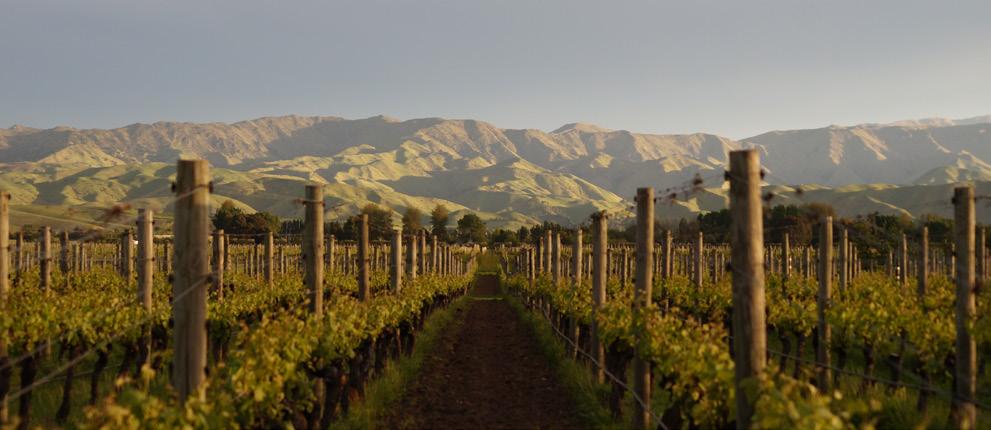
Marlborough wine emissions
CATHIE BELL
The New Zealand wine industry is already a world leader in the fight against climate change, says New Zealand Winegrowers general manager sustainability Edwin Massey. “In order to meet our goal of being carbon neutral by 2050 we need to continue to focus on the positive actions we can take year on year to make this goal a reality.” Speaking at a Climate Action Week Marlborough event in February, he said the 2022 Sustainable Winegrowing New Zealand report on greenhouse gas (GHG) emissions and energy showed that 41% of emissions happen in the vineyard – mainly from diesel use. With approximately 173,000 kilometres of vineyard rows throughout New Zealand, one tractor pass across all vineyards is equivalent to driving the length of New Zealand 108 times, using approximately 250,000 litres of diesel, Edwin said. “Reducing the number of tractor passes,
even by one per vineyard, would make a big difference.”
The report estimates emissions from wine production were 131,768 tonnes for the 2022 vintage, equating to 258 grCO2e per bottle. “Wine comes from a sense of place,” Edwin said. “Sustainability is critical to protect that place. So we have to invest in a focus on sustainability.”
Wine industry planning is currently focused on being carbon neutral by 2050, and Edwin is confident the industry has an appetite for that. “Climate change is a really key part of our whole environment strategy. It’s a really important goal – we want to get to climate neutral as quickly as possible.” His presentation provided a snapshot of regional emissions, and an overview of the Carbon Zero Road Map, as a guide towards the 2050 goal. Organisations such as EECA (the Energy Efficiency and Conservation Authority) say to electrify everything, and do it as fast as possible, Edwin said. “Our path is going to be around the electrification of the tractor fleet, reducing and combining passes as much as possible, and vines that need fewer agricultural chemicals.” Science and research will to play a key role in providing “secure, regular, and reliable” options, but industry needs to focus on what it can do immediately, he added. “Improvements in infrastructure and transport are important, but focusing on what we can do now is really important.”
New Ultra Compact Sidemount Base



Winepress Mar 2024 / 19 EDUCATE Contact FENCEPRO or AGRIVIT for more details.
Launching in March 2024 4-way movement available 1550mm minimum width 450mm of shift Local Support Compatible with: - Vineyard tractors. - Any FencePro postdriver. - FencePro Mastshift (enabling 4-way movement) 06 777 5363 03 572 8787
Fromm

Climate Positive
Lowlands tap into ‘amazing tech’
“What we really need, if we are talking about tackling the climate crisis, is to invest in carbon sinks.”
WHEN ROBERT Holdaway was a kid, he wanted a bach and a boat in the Marlborough Sounds, not a block of marginal land up the Wairau Valley. But three decades after his father planted 350 hectares of pines at Birch Hill, the Holdaway family’s commitment to climate positive winegrowing is rooted in the trees they grow as a carbon sink, and the pests they eradicate to protect them. “Yes, do emissions reductions,” Robert told audiences at the Marlborough Grape Days event last year. “But what we really need, if we are talking about tackling the climate crisis, is to invest in carbon sinks.”
Robert, who has a PhD in forest ecology from Cambridge University and spent eight years as an ecosystem ecologist at Manaaki Whenua Landcare Research, returned to the family vineyards in 2017 “as a slightly overqualified tractor driver”, joining his brother Richard at Lowlands Wines. The family wants to leave a positive legacy for future generations, he said. “And we are always looking for practical things that we can do to improve our business.” In 2020, Robert did a “ballpark” emissions profile for Lowlands, using standard lifecycle assessment methods. He found annual vineyard emissions of 991.34 kg CO2e (carbon dioxide equivalent) per hectare, and lifecycle emissions of Lowlands Wines per year of 0.828kg CO2e/bottle. The relatively low emissions are partly down to the Lower Wairau location, with high yields from 3 metre rows, as well as the likes of lightweight bottles and efficient logistics.

Dr Robert Holdaway
But any big carbon reductions in the future will require technological advances, including electric tractors, Robert said. That will be “especially promising” if they can be lightweight to reduce soil compaction, and automated, to help tackle labour shortages. “There’s a chance to merge those problems together and come up with a really good future solution.” Before that happens, New Zealand requires a massive increase in its renewable energy supply, he explained. “That is a big investment that needs to happen.”
Until the technology and infrastructure arrive, diesel use is inevitable for Lowlands, so they use trees to provide “breathing space”. Trees are “the ultimate carbon storing technology”, Robert told the audience at Grape Days. “This is something designed to be self-replicating and solar powered. The most amazing tech out there.” They’ve committed heavily to that ‘tech’, by replanting the original pine block after harvest. In 2020 they bought a 2,381ha hill country farm in the upper Wairau Valley and planted another 340ha of pine and 6ha of hardwood eucalyptus. The remaining 2,000ha became the Mt Impey Conservation Estate, with naturally regenerating native bush and mature remnant forest, all of which is vigilantly protected against grazing and predator pests.
The unregimented native block is much less effective as a sink than plantation, but has plenty of other positive benefits, Robert told attendees, noting that carbon cannot
The wealth of the sea to soil & plant.

PROTECT The vitamin and mineral content of TCKP Natural Kelp Tea analysed by Cawthron Research Institute | September 2012 Analysis Result Units Crude Protein 0 6 g/100 Aluminium 5 5 mg/kg Arsenic 2 6 mg/kg Boron 4 8 mg/kg Copper 15 mg/kg Iron 24 mg/kg Magnesium 290 mg/kg Nickel 0 66 mg/kg Phosphorus 120 mg/kg Potassium 3000 mg/kg Rubidium 1 2 mg/kg Strontium 22 mg/kg Zinc 7 0 mg/kg Tory Channel Kelp Products' certified organic Natural Kelp Tea is a complete food for plants and soils. Ideal for use in the vineyard via drip lines or as a foliar spray, and available in any quantity from 20 to 2000 litres in a single delivery to your preferred site. www.torychannelkelp.co.nz | 027 445 3708 | sales@torychannelkelp.co.nz
SOPHIE PREECE
Mt Impey Conservation Estate
be the only lens to view environment and ecology. “We would be doing this conservation work regardless of whether we were rewarded for carbon credits or not.” His family has been busy tackling wilding pines and cutting back pest numbers, including the feral cats that pose a major threat to birds that would otherwise help in the regeneration, by moving seed. About 400 traps have dealt to thousands of destructive possums, while 500 pigs and 800 goats have been killed during the past three years, said Robert, noting that 100 head of goats are responsible for 21 tonnes of C02 emissions in a year.
When it comes to offsetting emissions, Lowlands Wines is now “quite a bit climate positive”, Robert said, in the understatement of the event. The combined sinks of their natural and plantation trees accounted for 122,000 tonnes of C02 by 2023, set to grow to 280,000 tonnes by 2040. That means Lowlands, while creating 0.7% of Marlborough’s wine, will produce enough credits to offset 13% of the region’s wine industry emissions every year for the next 17 years.
Robert urged others to “implement easy-wins now” and invest in carbon sinks, either on their own land or in partnership with farmers who supply sheep for winter grazing. The region has “vast” areas of land “itching to go back into natives” and able to provide offsets until there’s technology to better reduce emissions. “Don’t sit around waiting for legislation to come in and force you to take action, or to reward you do the right thing – do it because it is the right thing to do, and it will make Marlborough a better place for future generations.”
Red herring for sequestration
While trees are perfectly designed for carbon sequestration, growing soil carbon is a bit of a “red herring” when it comes to offsetting emissions, says Dr Robert Holdaway. “It is a very, very, very good thing. But for us it’s not a solution to carbon sequestration.” Much of Lowlands Wines’ management is aimed at putting carbon back into the soil, with Robert calling the operation “conventional-plus”, maximising photosynthesis and using cover crops, roller crimping, compost, rotational sheep grazing, biological controls and soil bio-stimulants to grow soil health. But most of this added carbon gets used as food by the soil biology and released as CO2, he says. “So, in fully functioning soil the vast majority of the carbon put in on an annual basis gets respired back out again by soil life.”


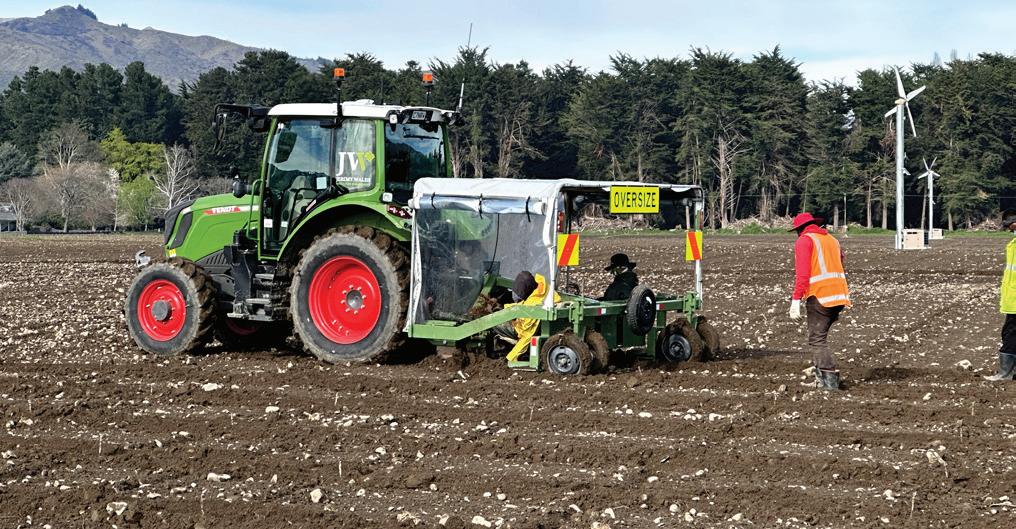

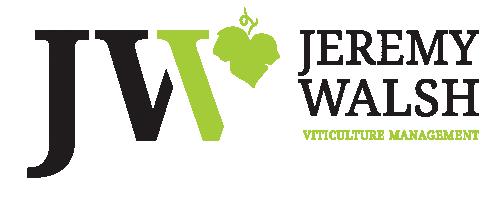
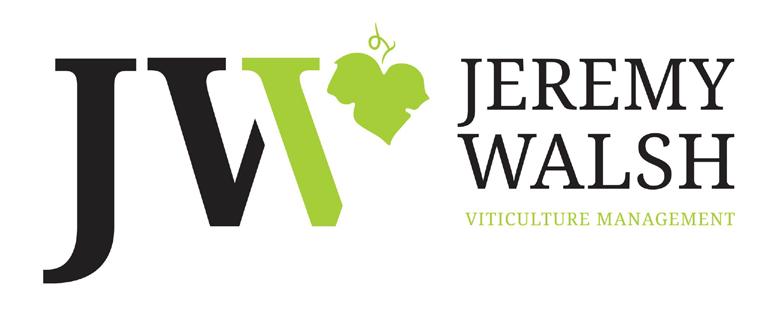
Winepress Mar 2024 / 21 EDUCATE JWVM has capacity for the coming season. We welcome new clients to our management portfolio.
OFFER OUR CLIENTS: Fully customisable management plans, A team of quality, experienced operators, Excellent machinery and equipment, High standards of service & viticultural support. We are geared up for all your redevelopment needs. Call: Jeremy 021-556722 | Shane 021-615154 www.jwvm.co.nz | @jwvm.nz
WE
Native mistletoe Tupeia antartica recovering after reducing possum numbers
Generation Y-ine
Getting a taste for winemaking
KAT
PICKFORD
WHEN UNIVERSITY students taste wine, it’s often more for the effects than to gain a deeper appreciation. But when Thomas Jordaan was first introduced to “decent wine” while studying earth science, geology and the environment at the University of Stellenbosch – in South Africa’s most wellknown wine region – his curiosity was piqued.
“Being poor students at the time, wine tasting at the region’s cellar doors was a free, or at least cheap way to entertain ourselves,” Thomas says. “That initial tasting really opened my eyes – it was like a revelation that you could get something really refreshing but at the same time so complex.”
“That initial tasting really opened my eyes – it was like a revelation that you could get something really refreshing but at the same time so complex.”
Thomas gradually gained more interest in wine, and what started out as fun trips with friends, turned into more serious wine tastings with the intention of learning more about wine and how it was made. After completing his fouryear bachelor’s degree with honours, he moved to nearby Cape Town to embark on a two-and-a-half-year thesis in the field of chemical engineering. While there, he realised he wasn’t keen on working in a mine, where he would be based “in the middle of nowhere for months at a time”, so after completing his thesis he put his name down for a vintage in Boschendal Wine Estate in Stellenbosch, to get a taste of a career in the wine industry.
“That was really when I started to see things differently and I seriously started considering a career in wine,” Thomas says. “Boschendal was established in 1685, so it has a lot of history, but also has a lot of variability. Vintage started in January with sparkling varieties and progressed to whites and reds. It lasted four months in total and I saw a whole lot of different wine making techniques in that time including sparkling, classic whites, barrel ferments, red ferments and sweet wines.”
During that formative first vintage in 2018, he learned a lot about the industry and discovered it was possible to travel, work a vintage, make some money and travel again. The idea of being a flying cellar hand and eventually a flying winemaker was hugely appealing and he immediately began
Thomas Jordaan
applying for roles at wineries in Sonoma, California. After his second vintage in the United States, he was confident a career in wine was for him, so he decided to make it official with some study, electing to do a one-year graduate diploma in Viticulture and Oenology through Lincoln University in Christchurch.
Following his studies, he continued to pick up experience working vintage at a number of New Zealand wineries including Tony Bish Wines and Alpha Domus Winery in Hawke’s Bay, plus a winter pruning job on Waiheke Island, before being offered a full-time cellar hand position at Vavasour in the Awatere Valley.
In 2022, he jumped at the opportunity to step up into an assistant winemaker position with Indevin. Now, approaching his 10th vintage, the 31-year-old is excited to see what this year’s harvest will bring. “It’s an exciting time of year, it definitely keeps everyone on their toes,” he says. “It’s looking pretty light this year, but across the board quality is looking very high for all varieties. It will be interesting to see how vintage 2024 will taste.”
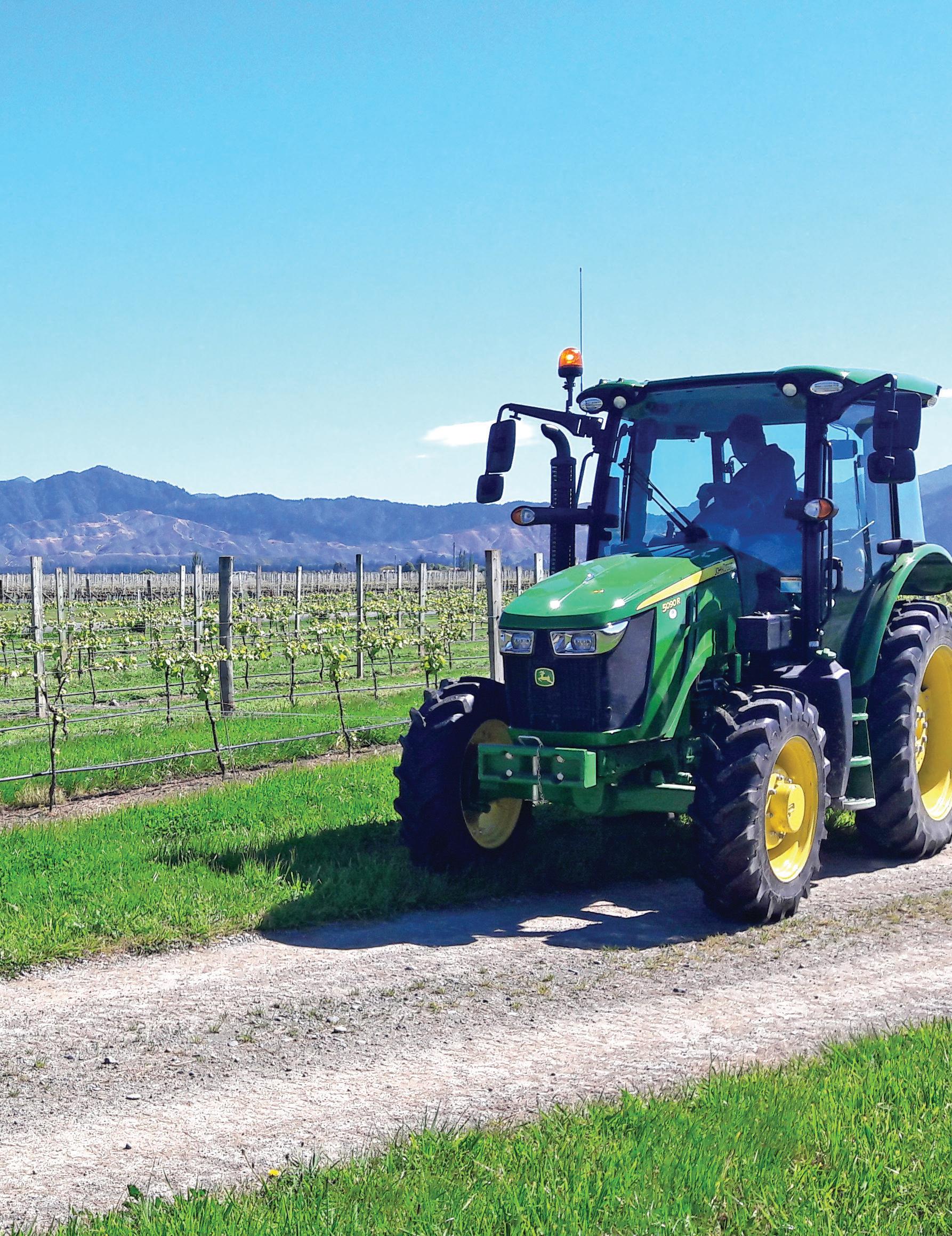

22 / Winepress Mar 2024 CELEBRATE


VINEYARD TRACTOR GREAT DEALS ASK FOR A DEMO TODAY PROVEN LOW COST OF OWNERSHIP IN THE MARLBOROUGH REGION 5090R RUN OUT FROM $119,900 + GST ONLY $2,265 PER MONTH* ALSO AVAILABLE 5125R FROM FROM $136,300 + GST *Conditions apply. John Deere Financial Limited. Approved commercial applicants only. Based on Advertised Price $119,900 on a 36 month term,30%deposit and GST back in month 3. Fees and charges of $425apply. Machines must be delivered by 31/05/2024. If not amended or withdrawn earlier, the promotion expires on 30/04/2024. 1.99 P.A. %* FINANCE AVAILABLE NOW WITH Please call Mark Allison on 027 5544 349 or Josh Wilson on 027 3240 822 • Command8 32/16 40kmh Transmission • Diesel only IT4 Engine • 117L/min PFC Hydraulic System • Cab Suspension • Free Telematics on-board via Modem • ISO/Greenstar Ready • 5yr / 5000 Hr Warranty • 1840mm Width = 2.5m Row Widths +
Biosecurity Watch
Biosecurity Business Pledge an incorporated society
SOPHIE BADLAND
AT THE end of 2023, the members of the Biosecurity Business Pledge voted for it to become an incorporated society, reflecting the growing success of the programme since it was first established in 2019. Currently the Pledge has more than 400 members across the country. Has your business signed up yet?
The Biosecurity Business Pledge is an opt-in pledge open to all New Zealand businesses, encouraging and supporting the business sector to take a proactive approach to biosecurity. Developed by businesses in partnership with Biosecurity New Zealand, the Pledge provides a framework to assist businesses to manage the risks of unwanted pests and diseases, and is designed to make biosecurity a core part of operational activity and business-as-usual. New Zealand Winegrowers (NZW) signed the Biosecurity Business Pledge as a supporting member at its initial launch in 2019. One of the best aspects of the Pledge is the collaboration that occurs between businesses. No matter where a business is at with biosecurity, from those with limited knowledge and nothing specific in place to those who have highly effective plans and procedures in place, the Pledge welcomes everyone and provides resources to enable everyone to actively participate.
The first official AGM was held in December last year, with a resolution was passed to bestow Incorporated Society status on the Biosecurity Business Pledge. This allows the Pledge leadership to charge for membership, and implement a more formal structure to ensure the momentum that has been gained over the last four years can be sustained, and that value will continue to be provided to Pledge members. A seven-member executive committee from a range of businesses now oversees the Pledge, with Executive Director Debbie Teale responsible for the day to day activity.

What do Pledge members get out of it?
Since it’s inception, the Pledge has held regular events for it’s membership, including monthly webinars and annual forums. The webinars are always well-attended, with presentations given by Pledge members demonstrating why biosecurity is important to their business and the types of work they are undertaking. At these webinars Pledge members might share resources, talk through their journey to embedding good biosecurity practice in their business, report on biosecurity simulation exercises, discuss new technologies to aid with good biosecurity practice, or highlight issues they are having that the wider Pledge membership may be able to assist with. Biosecurity New Zealand staff also give regular updates, particularly from the border clearance space to highlight any trends that members need to be aware of that may impact on business or supply chains. The forums are a chance for Pledge members to meet face to face, and often include workshops, new resource launches or a simulation exercise. Pledge members also get regular email update newsletters and are able to use the Biosecurity Business Pledge logo as part of their business branding, to demonstrate the commitment they have made.
A number of business biosecurity resources have also been developed for members by working groups which have formed within the Pledge membership. Some of these are publicly available, such as a CEO Guide to the Management of Biosecurity Risk, and Biosecurity Considerations for Boards. These can be found at thisisus.nz/biosecuritybusiness/biosecurity-business-pledge/. The Pledge also presents an opportunity for two-way information flow between businesses and the government, which helps to identify and solve practical difficulties and challenges faced by businesses within the wider biosecurity system, ensuring it functions better for all involved.






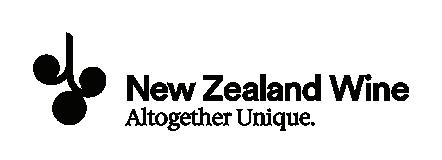
24 / Winepress Mar 2024 PROTECT
IF YOU SEE ANYTHING UNUSUAL CATCH IT. SNAP IT. REPORT IT. CALL THE BIOSECURITY NEW ZEALAND PEST AND DISEASE HOTLINE 0800 80 99 66 Email enquiries to biosecurity@nzwine.com
What does it mean to take the Pledge?
Taking the Pledge doesn’t mean a business needs to already have top-notch biosecurity practices in place – there are several members right at the start of understanding how biosecurity considerations affect their business and what they can do to help mitigate the risks. Taking the Pledge is about making a genuine commitment to improve on current status and make biosecurity visible within the business. By signing up to the Biosecurity Business Pledge, a business is simply agreeing to:
• Actively seek to understand and manage the biosecurity considerations associated with business activities
• Promote a culture of proactive biosecurity management within operations, across the business, around board tables, and within teams
• Incorporate biosecurity into the procurement policies that guide selection of goods, travel, logistics, and service providers
• Take opportunities to support customers, staff, suppliers and stakeholders to understand the importance of biosecurity and what good biosecurity practice looks like.
There is no audit or verification process associated with the Pledge. There are five Pledge membership categories based on the size of the business. Members self-select the level of fee they contribute, based on either number of employees or business revenue. Fee categories start at $400 for small businesses with less than 100 employees or less than $20

million annual revenue, and range up to $5,000 for large businesses with more than 5,000 employees or revenue of more than $2.5 billion. Should my business sign up?
Yes! NZW encourages all members to check out the Biosecurity Business Pledge and consider becoming a member. Biosecurity is critical to the long-term sustainability of the New Zealand wine industry, so we all need to do our bit to mitigate risk throughout all parts of the supply chain. Several wine businesses are already Pledge members, including Pernod Ricard New Zealand and Wineworks; a case study featuring Pernod Ricard New Zealand can be found on the Pledge website. For more information, reach out to the Pledge directly by contacting Debbie Teale on 021 811 866, or get in touch with the NZW biosecurity team at biosecurity@ nzwine.com.
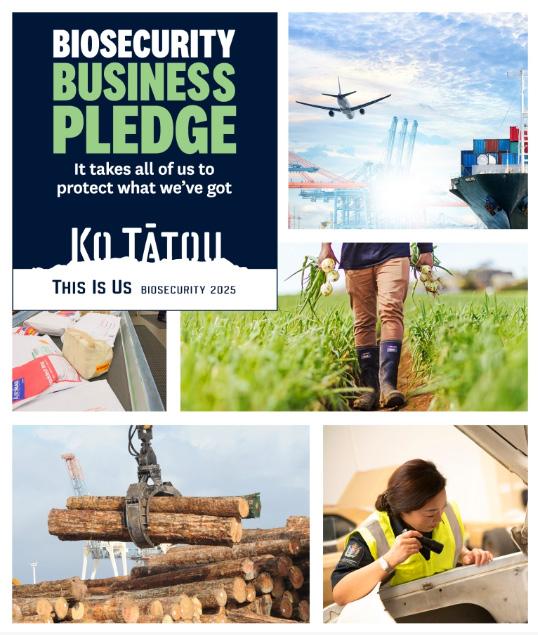
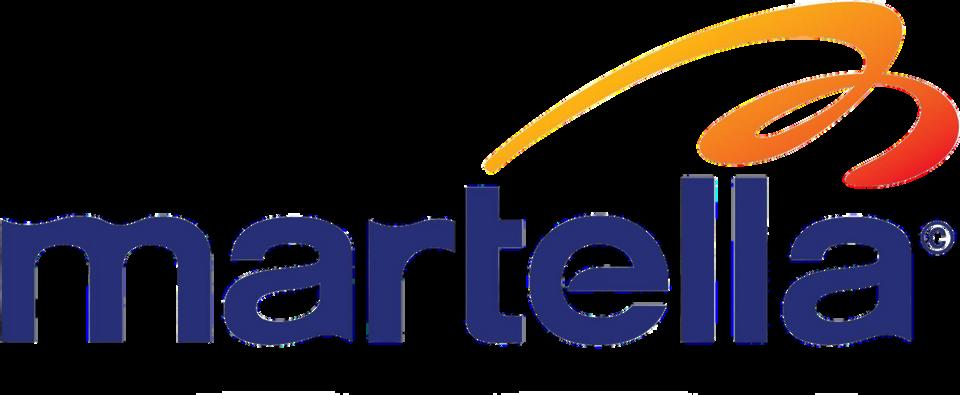


Winepress Mar 2024 / 25 EDUCATE Design & Installation Maintenance & Service Hire Chiller Solutions Repairs - call 24/7 1 Freswick St, Blenheim | www martella co nz Email: office@martella.co.nz Phone: 03 578 0030 - 24/7 REFRIGERATION & AIR CONDITIONING Your local specialists for over 40 years • Commercial & Industrial Electricians • Automation & Control systems • Winery Upgrades • Winery Design & Build 24/7 EMERGENCY CALL OUT Phone: 0274 497 689 Email: admin@electratech.co.nz Website: www.electratech.co.nz
Industry News
Champagne Sailing
Conditions were set for glamour and ease in the 2024 WineWorks Marlborough Wine Race in February, says sailor and grape grower Jono Bristed. “As Freedom set off early in the morning carrying the sponsors Orora, Liquid Action, and of course the long time supporters WineWorks Marlborough, they were able to see that we had nothing but ‘Champagne
sailing’ ahead of us.” This year’s event had two races at the same time, with line honours in the inshore race, from Picton to Resolution Bay, awarded to Grove Mill Wines, onboard Tour De Force. Meanwhile the offshore division had light winds in the outer Queen Charlotte Sounds quickly building to a “stunning 15 knot nor wester”, and ended at Resolution Bay with The Ned wines, carried by Flying Fox, winning line honours, followed closely by Villa Maria and Vavasour, on Oldsmobile. It was a “brilliant day” says WineWorks general manager Damien Gillman. “The Sounds turned on terrific weather and our hosts on the magnificent Freedom vessel made the experience all the more enjoyable.”
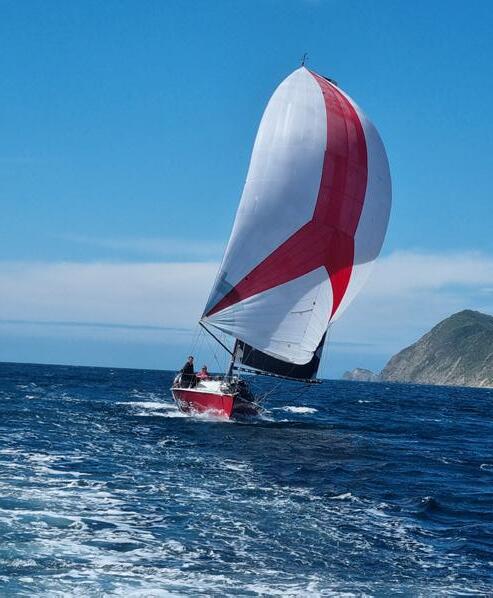

Brookby Beats
The sold-out Brookby Beats event celebrated Marlborough’s Southern Valleys in style, featuring five bespoke wine producers alongside Marlborough culinary delights and plenty of entertainment. “Attendees had an amazing experience, full of storytelling and celebration while connecting with the place and producers,” says marketing manager Shorona McLeay. The event took place the evening before the Marlborough Wine & Food Festival, and guests thoroughly enjoyed being surrounded by the vines in the Two Rivers Brookby Hill vineyard as the sun set, she says. “Beccie B and Murry Sweetpants kept the dance floor jumping.” Plans are already underway for the 2025 event. “Our goal is to turn Brookby Beats into a highly anticipated annual event that extends the offerings of the Marlborough Wine & Food Festival, creating a weekend-long celebration of local wine, food, entertainment, and the region.”
Organic Winter Workshops

Tickets are on sale for the Horticentre Charitable Trust Organic Winegrowers New Zealand Winter Workshops tour. Kelly Mulville, from Paicines Ranch in California, will deliver a series of workshops around the country, with the Marlborough event on June 12. Kelly has pioneered the regenerative viticulture movement in the United States with an approach that aims to move with climate change and reduce the environmental footprint of vineyards by developing innovative viticultural growing systems. organicwinenz. com/kellymulvilletour
Advocacy Update
NICCI ARMOUR
The peak of vintage is just around the corner, and it is a tough and busy time for many people. There were some amazing wellbeing initiatives introduced last year and showcased during Wine Industry Wellness Week 2023. Here are some additional tips from our friends at Farmstrong to get through:
• Fuel the tank: eat food to keep your energy levels up
• Take mini breaks: a power nap helps recharge your batteries
• Be wise and prioritise: think about what the priority is, what you can live with, and work back from there
• More at: farmstrong.co.nz/getting-through-busy-times The Workplace Relations and Safety Minister has announced that the adult minimum wage will be rising to $23.15 per hour from Monday, April 1, 2024. This is an increase of 45c per hour from the current hourly rate of $22.70. This is a reminder to ensure that all your employees are meeting the minimum wage rate by 1 April 2024 (this also includes if the employees are being paid on a piece rate). In the coming weeks and months, the team at Wine Marlborough, supported by industry steering committees and working groups, will be sharing some exciting new developments for the wine industry’s workforce and the environment and circularity. Make sure you are subscribed to Marlborough Wine’s Wine Mail to stay up to date and also ensure the contact details of you and your staff are correct on New Zealand Winegrowers’ member database. Nicci Armour is advocacy manager at Wine Marlborough
26 / Winepress Mar 2024
Villa Maria and Vavasour flying along in Oldsmobile
Homing in on human rights
Winegrowers need to equip their workers with information on their rights and routes to remedy, says New Zealand Ethical Employers chief executive Tanya Pouwhare, having returned from a Berlin roundtable on human rights challenges in agricultural supply chains. That’s just one of the recommendations she has shared following the GLOBALG.A.P (GGAP) event, along with the need to include basic protections for all workers in business processes and employment agreements. Winegrowers must ensure the promotion of fair and ethical recruitment practises for all, and should make training and awareness on human rights and labour risks within a business made widely available for everyone “from managers through to frontline workers”, says Tanya, who is based in Marlborough. “Grapegrowers have a vital role in ensuring ethical practices and can contribute by engaging with contractors and promoting fair treatment of workers. By staying informed and participating in initiatives, we can create a fairer, more sustainable industry.” She’d also like to see “enhanced collaboration with other supply chain actors to pursue collective proactive measures, rather than reactive solutions in silos”.
New Zealand Ethical Employers (NZEE), which has membership servicing 36,151 hectares of the 41,860ha of wine grapes planted in New Zealand, was invited to attend and present at the event, which included representatives from the main European retailers as well as producers, NGOs and certification bodies. Tanya presented on NZEE’s membership compliance mechanism, and its Human Rights Due Diligence (HRDD) framework for small to medium enterprises. She also discussed NZEE’s collaboration with GGAP on development efforts to establish a standalone compliance standard for employers, which will be piloted in October this year. “The standard intends to be a comprehensive labour and human rights solution for the agricultural industry globally,” Tanya says. She also led several discussion groups focusing on HRDD regulation, imminent changes, and shaping future action points.
Key speakers included Joe Martinez from CIERTO Global, who highlighted pre-departure training programs for workers, emphasising empowerment, safety, and collaboration. Henning Kleinespel from the German Fruit Trade Association emphasised legislative compliance and proactive risk management. Tanya says worker exploitation comes in many forms, ranging from illegal sourcing practices (“unethical recruitment”) to financial stress and labour shortages creating opportunities where workers aren’t paid correctly, or extreme working hours are demanded. “Identifying these issues early is crucial to preventing more severe harm down the line.” Social audits, risk assessments, and worker training are some of
the tools currently being used globally and in New Zealand to combat exploitation, she says.
“Voluntary standards like GGAP NZGap, and SWNZ (Sustainable Winegrowing New Zealand) play a role but cannot replace corporate responsibility and accountability.” New Zealand employers are bound by international human rights guidelines and have robust

legislation protecting workers’ rights, while “organisations like NZEE are leading the charge in promoting responsible supply chain management”.
Migrant labour poses unique challenges, but policy refinements and collaborative efforts can ensure fundamental protections for all workers, Tanya says.
“Initiatives like Appellando are paving the way for multistakeholder, industry-wide grievance mechanisms with the aim that every worker and rightsholder can find access to help through trusted channels, globally.” Mandating HRDD and enhancing collaboration among supply chain actors are recommended actions to address exploitation effectively, Tanya says.
Tanya’s trip was made with the support of Woolworths Group New Zealand.
Houghton Estate is a 2-hectare vineyard located at Delta Lake Heights, which is currently contract free due to a recent change of ownership. Planted with 0.7 hectares of Pinot Noir and 1.3 hectares of Sauvignon Blanc with good cropping history. Approximately 4-5 tonnes of Pinot Noir and 18-20 tonnes of Sauvignon Blanc will be coming available.
Please call
Huma Houghton on 027 438 2810 or email on
humahoughton@gmail.com.
Winepress Mar 2024 / 27
SMALL PARCELS OF CONTRACT FREE FRUIT AVAILABLE FOR
2024
CLASSIFIEDS
HARVEST
Wine Happenings
A monthly list of events within the New Zealand wine industry. To have your event included in the April 2024 Wine Happenings, please email details to sophie@sophiepreece.co.nz by March 20. For more information, please go to the website supplied or email sarah@winemarlborough.nz
MARCH
3 Forrest Summer Sunday Sessions every Sunday until the end of April 2024 (marlboroughnz.com/events)
8 Framingham Harvest Concert 2024, 5:30pm - 11:00pm (marlboroughnz.com/events)
9 Marlborough Multicultural Festival 2024, Churchill Glade at Pollard Park (marlboroughnz.com/events/marlborough-multicultural-festival-2024)
9 Pre-Harvest Social presented by the Roots Gin Shack
APRIL
6 Yoga at Clos Henri vineyard
MAY
3 International #SauvBlancDay
11 Saint Clair Vineyard Half Marathon (vineyardhalf.com)
27-31 Marlborough Wine Industry Wellness Week
JUNE
12 Horticentre Charitable Trust Organic Winegrowers New Zealand Kelly Mulville tour (organicwinenz.com/kellymulvilletour)
25-27 WinePro; Vine to Wine, Marlborough Lines Stadium 2000 (winepro.co.nz)
JULY
4 Marlborough Young Viticulturist of the Year competition 2024 (nzwine.com/en/events)
31 Marlborough Young Winemaker of the Year competition 2024 (nzwine.com/en/events)

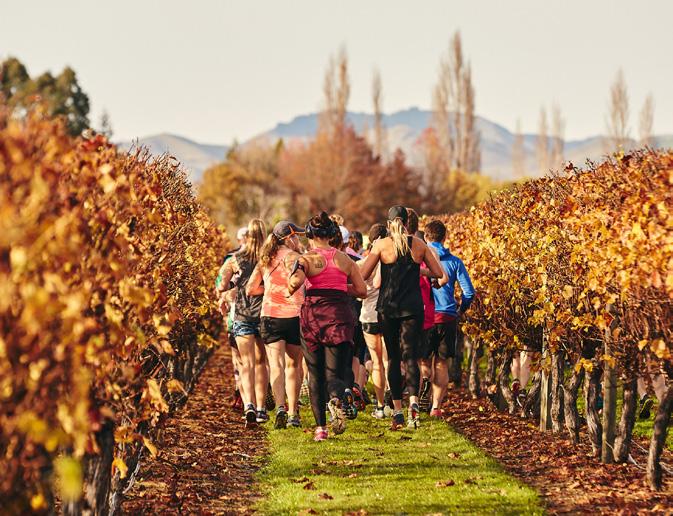
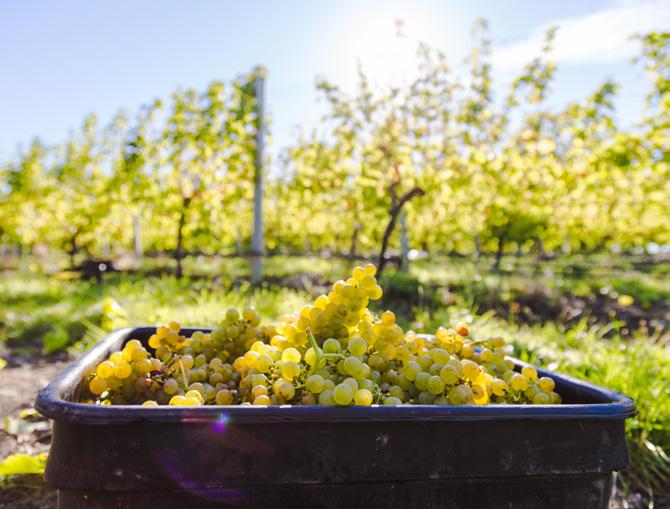


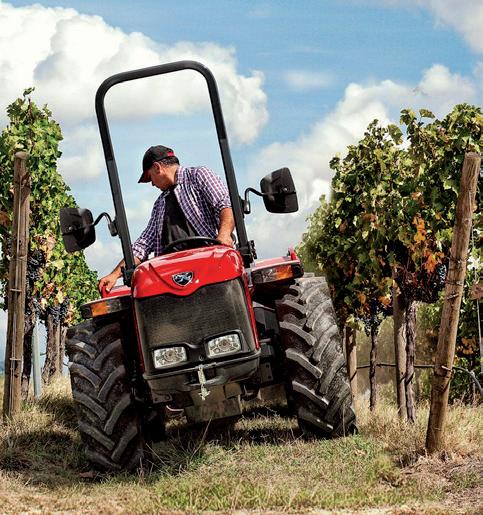







28 / Winepress Mar 2024
WinePro; Vine to Wine – June 25-27
Vineyard Half Marathon – May 11
Framingham Harvest Concert – March 8


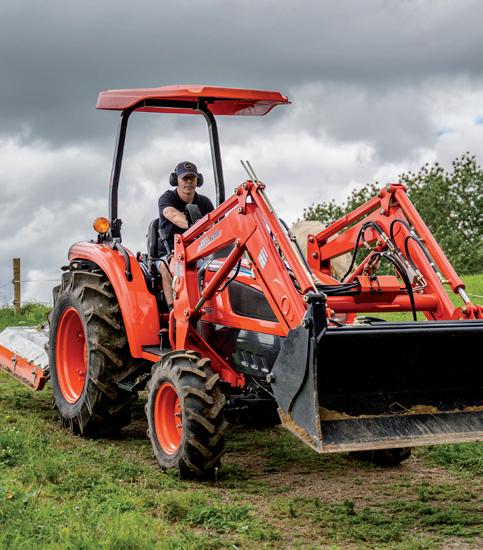
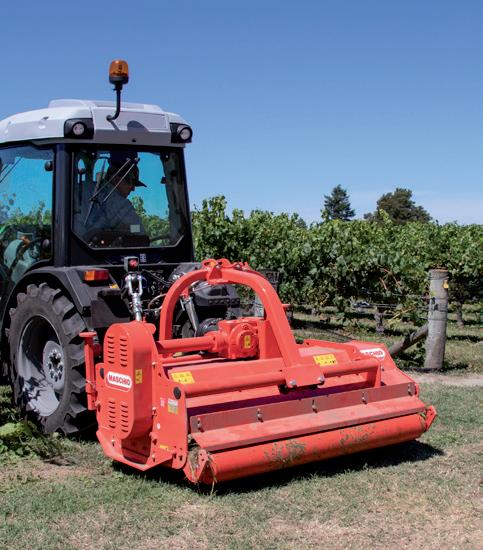
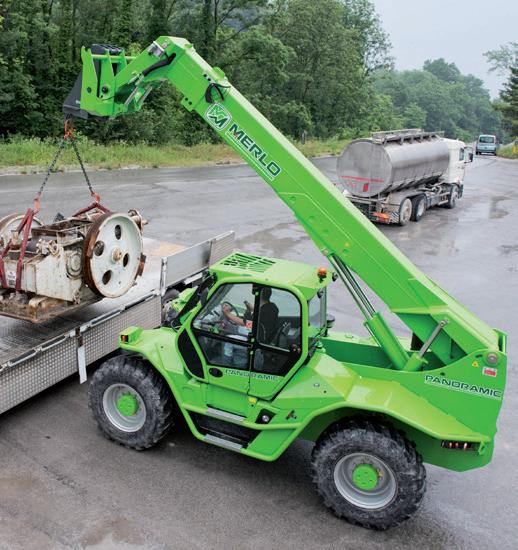

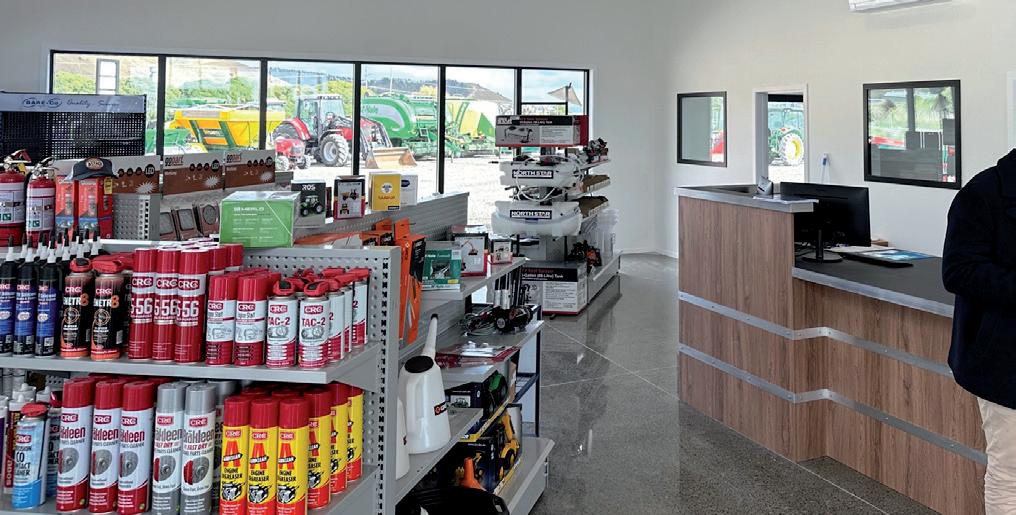


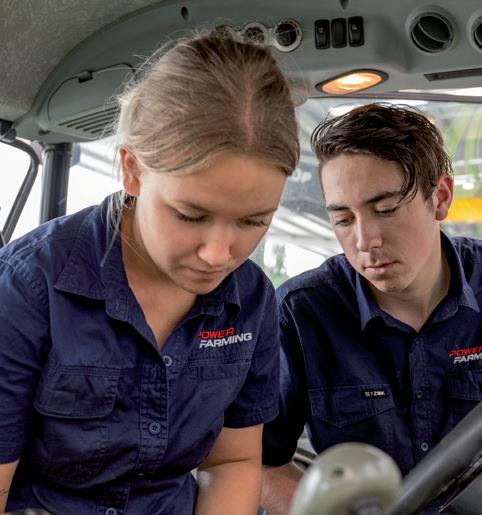
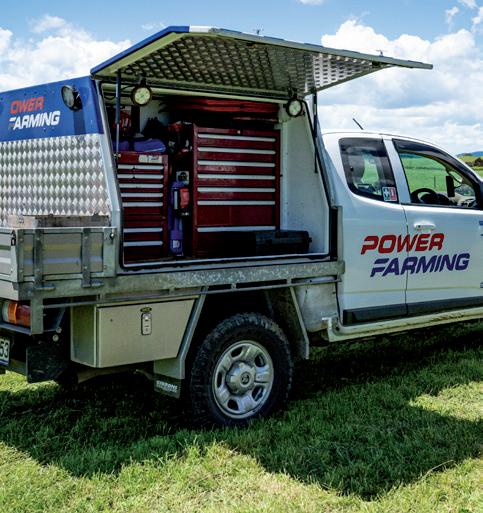
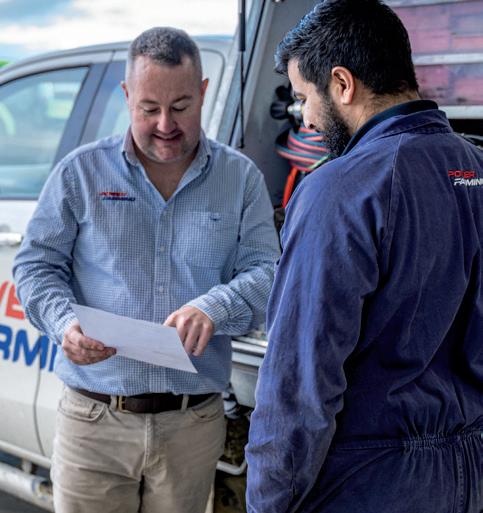
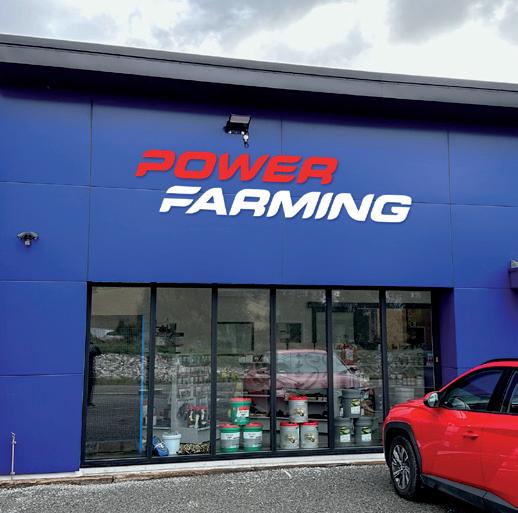


deutz nz *Terms and conditons and normal lending criteria apply. Prices valid for a limited time only and while stocks last. 4000 hour/4 year warranty. CONFIGURE TO SUIT YOUR REQUIREMENTS We’ve got a specialised tractor that’ll work on your farm, with slim-line to compact and your choice of transmissions. Give us a call for more information. SPECIALISED TRACTORS We keep you growing Visit us at our purpose built building at the Riverlands Truckstop, 3535 State Highway 1, just out of Blenheim
experienced team now have a state-ofthe-art workshop to ensure your gear is always ready to work hard for you when you need it. Does that Silvan Sprayer need a service? We do
to tractors, right through to construction equipment. Give us a call or drop in, we service
makes and models and can have
you in
48 hours. Make sure your equipment is ready to work as hard as you do. Riverland’s Truckstop, 3535 SH 1, Blenheim | 03 573 7089 Russell McGhie Service Manager 027 365 1617 Dave Jeffery Sales 027 291 9576 Bryan Simpson Parts Manager 027 362 1429 Richard Shenfield Dealer Principal 027 777 3313
Our
sprayers,
most
most parts for
under
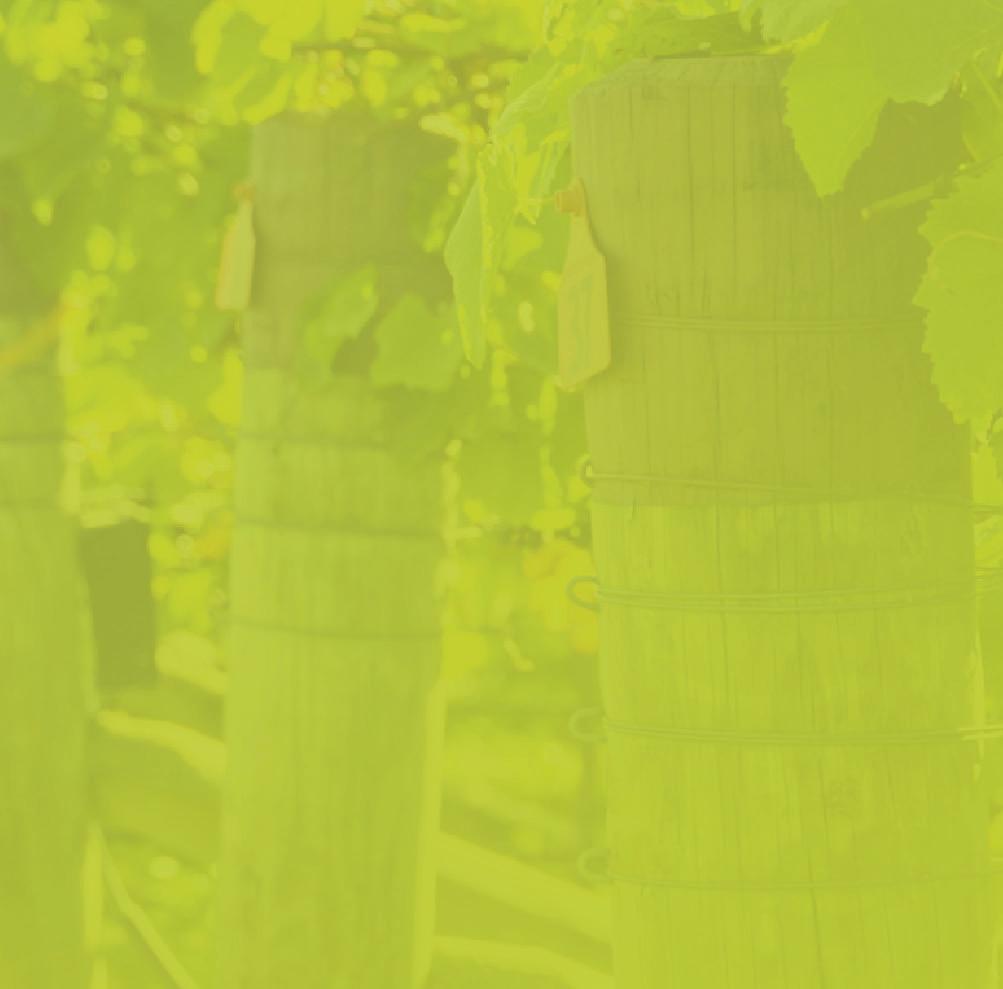
Collaborating, innovating and supporting growers in New Zealand
For more than 100 years, Fruitfed Supplies have worked closely with growers, suppliers and industry bodies to support the success and sustainability of the viticulture sector.
Our stores stock a wide range of supplies for both conventional and organic wineries including:
> Dry goods & enzymes
> Cleaning products
> Fermentation & filter aids
> Yeast & sugar
> Fining products


We know horticulture
Contact your local Fruitfed Supplies team, or visit fruitfedsupplies.co.nz for more information.
www.fruitfedsupplies.co.nz



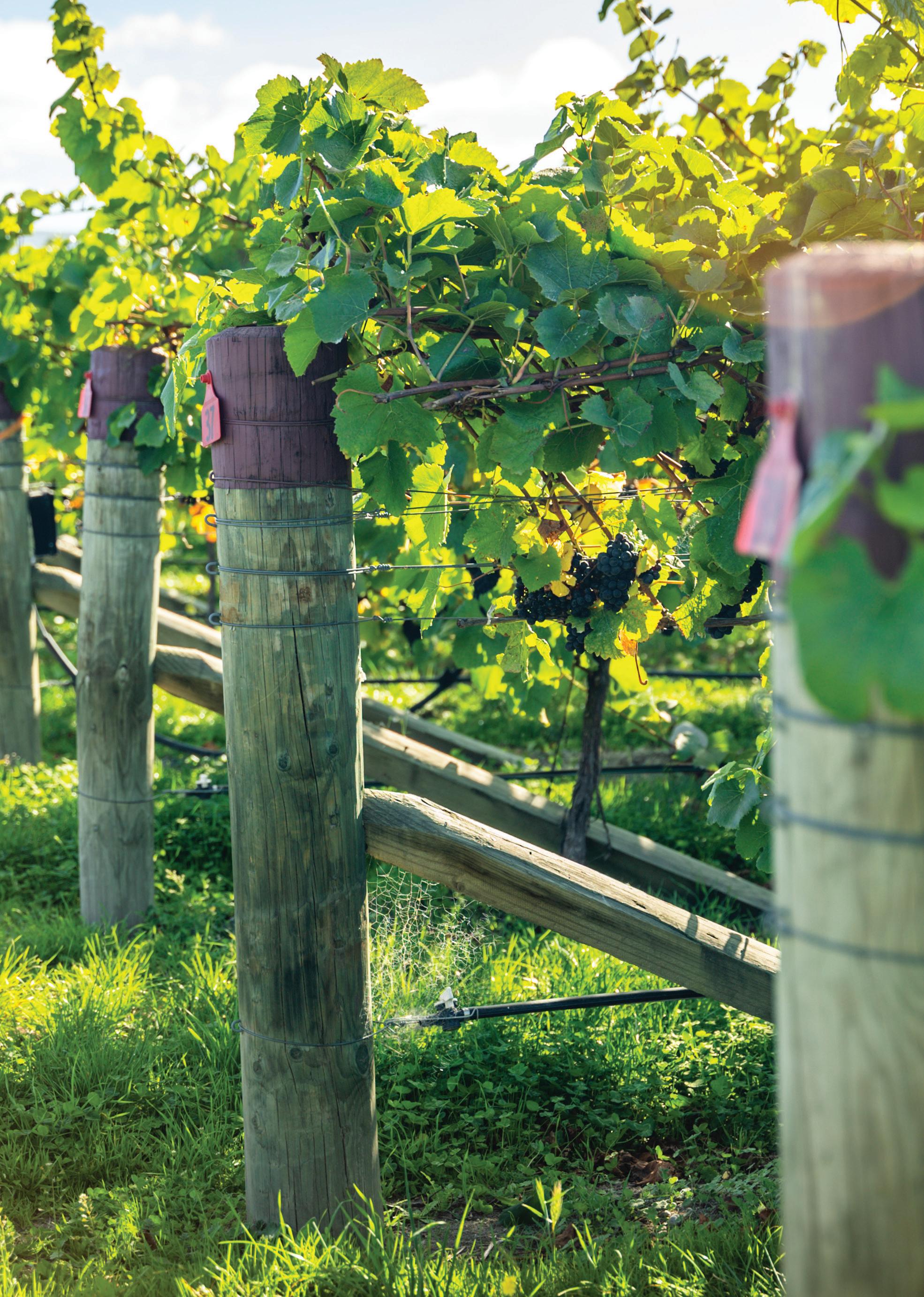
A trading division of PGG Wrightson Ltd



















































































































































